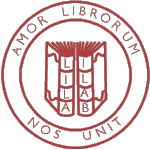List January 2024
|
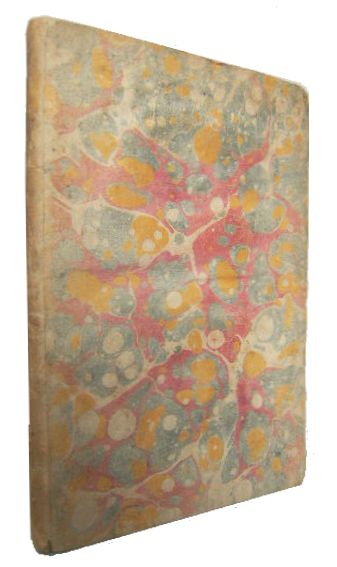 |
[AMIGONI, Bartolomeo.]
Sopra il programma proposto dalla Reale Accademia di Torino di provvedere alla sussistenza dei tessitori di seta
quando questa scarseggi o manchi ecc. Memoria di Momoalberto Manigio membro di nessuna Accademia neppure agraria.
Cosmopoli [Vicenza] 1788.
70p. Contemp. limp marbled boards. A fresh copy. (#37929)
€ 350 | 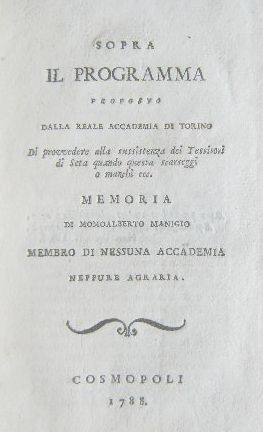 |
First (only) edition, very rare. A proposal on the provision for unemployed silk weavers, written in answer to a
question proposed by the Royal Academy of Turin. Workers in the silk industry were often out-of-work because of scarcity
of raw materials, and the author suggests among other things the diversification and a more economical dealing with raw
materials, the undertaking of public works, etc.
*Not in Kress, Goldsmiths' or Einaudi. WorldCat locates a copy in Harvard Business School only.
AVENARIUS, Richard (1843-1896)
Philosophie als Denken der Welt gemäss dem Princip des kleinsten Kraftmasses. Prolegomena zu einer
Kritik der reinen Erfahrung.
Leipzig, Fues's Verlag (R.Reisland) 1876.
XIII,[1],82p. Orig. cloth-backed printed boards, front hinge split. Presentation inscription for Oswald
Marbach on front free endpaper. (#37042)
€ 600
First edition of the author's Habilitationsschrift from the University of Leipzig. Avenarius was a German-Swiss
philosopher, professor in Leipzig and since 1877 in Zurich, a radical positivist and a pioneer of the theory of
empirio-criticism.
Gotthard Oswald Marbach (1810-1890) was professor of philosophy in Leipzig from 1845 to 1882, and a poet and
freemason.
| 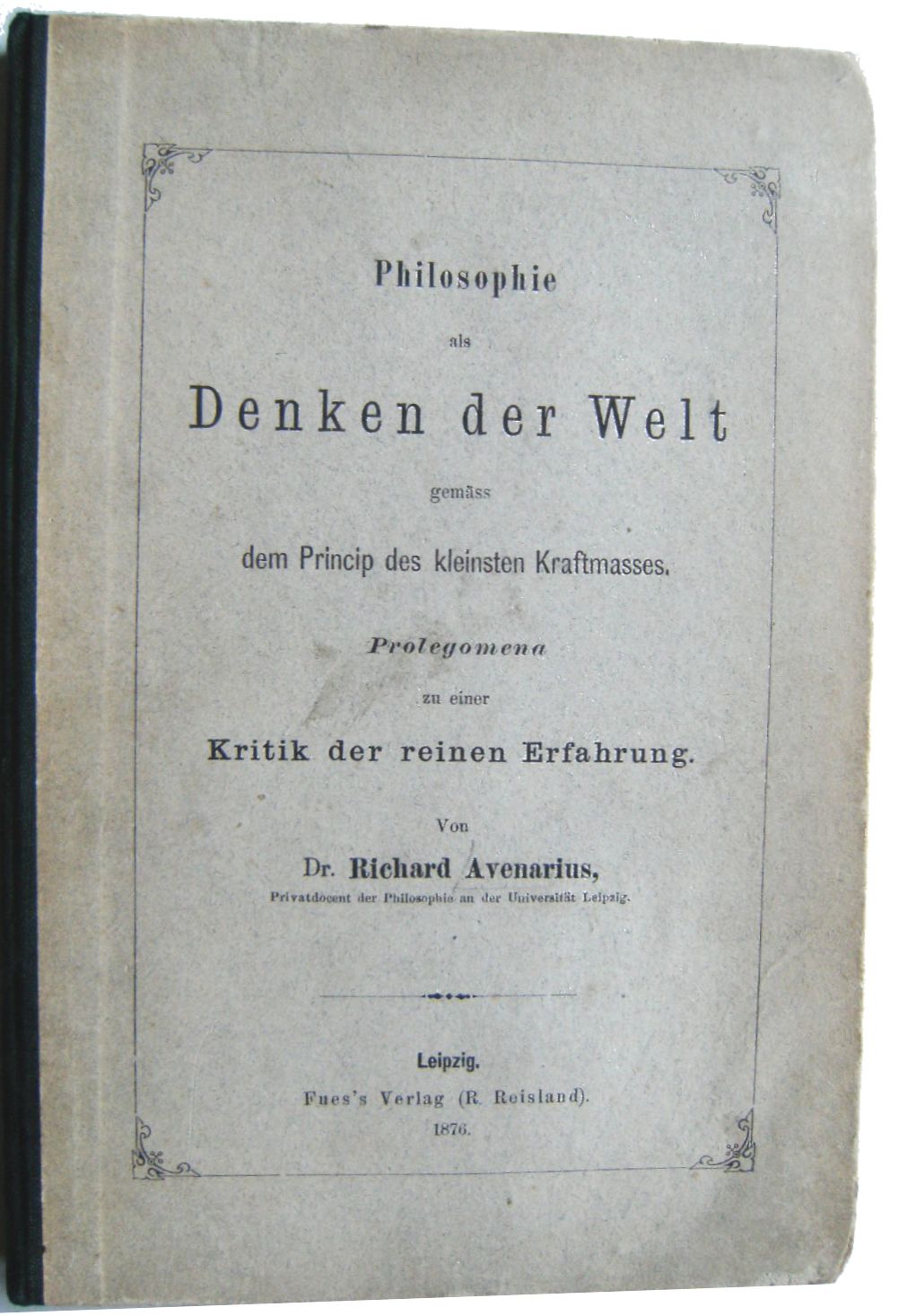 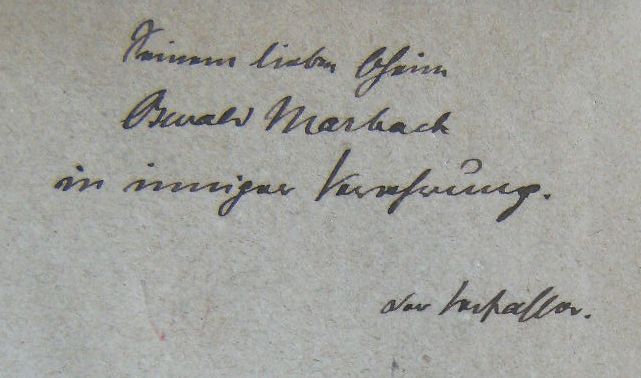 |
The Dutch in BrazilBARLAEUS, Caspar (1584-1648)
Rerum per octennium in Brasilia et alibi gestarum, sub praefectura illustrissimi Comitis I. Mauritii, Nassauiae
&c. Comitis, historia. Editio secunda. Cui accesserunt Gulielmi Pisonis medici Amstelaedamensis tractatus 1. De aeribus,
aquis & locis in Brasilia. 2. De arundine saccharifera. 3. De melle silvestri. 4. De radice altili mandihoca.
Clivis [Kleve], Tobiae Silberling 1660.
Small 8vo. [XII],664,[21]p. With engraved title, portrait and coat-of-arms, 3 folding engraved maps
(South America and the Western part of Africa, Brazil under Dutch rule, and Mauritiopolis, Recife and surroundings) and 5
folding engraved views. Contemp. vellum, back with red label. With bookplate of the famous book collector John Carter
Brown (and his name stamp in red on the verso of the portrait), and bookplate of the book and art collector M. Pimenta
Camargo. Without the plate of a sun-eclipse present in part of the copies. (#34387)
€ 4500
 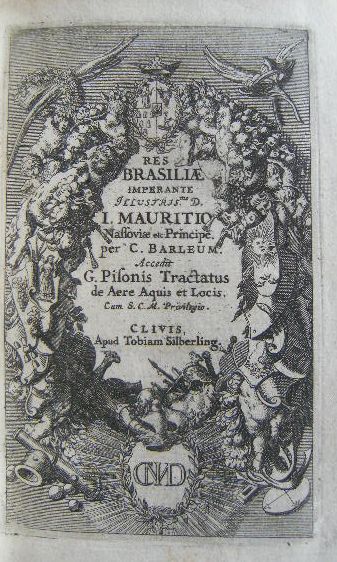 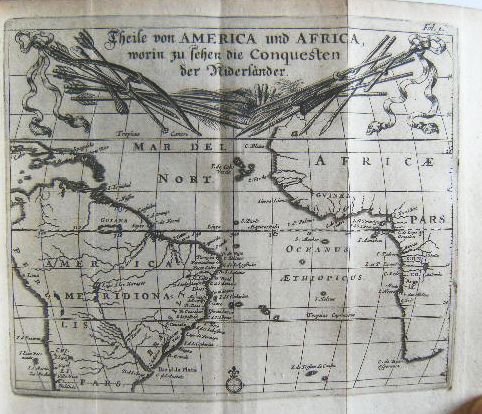 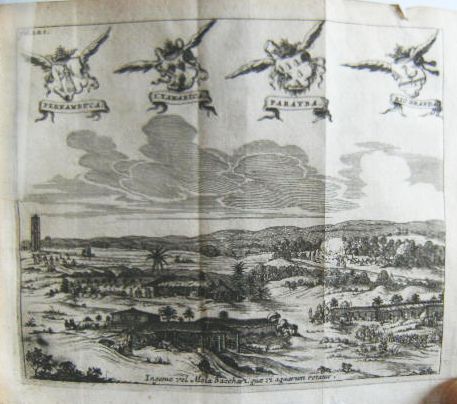
Second Latin edition of this famous history of Dutch rule in Brazil under Johan Maurits van Nassau
from 1637 to 1644. The first edition in folio is extremely rare and valuable, since most copies and the plates were lost in a
fire at the workshop of the printer Blaeu. The plates and maps of this edition are identical with those in the German edition
of 1659. The plate of the sun-eclipse was not present in that edition and seems to have been added to a part of this Latin
edition only. The present edition has added some contributions to the natural history of Brazil by Johan Maurits' physician
Willem Piso.
*Sabin 3409.
A desirable copy of the only Dutch edition of the most
important work on the Dutch period in BrazilBARLAEUS, Caspar
(1584-1648)
Nederlandsch Brazilië onder het bewind van Johan Maurits Grave van Nassau 1637-1644.
Historisch-geographisch-ethnographisch. Naar de Latijnsche uitgave van 1647 voor het eerst in het Nederlandsch bewerkt
door S.P. l'Honoré Naber.
's-Gravenhage, Martinus Nijhoff 1923.
Folio (45x30 cm). XVI,442p. With portrait, frontispiece, 67 mostly folding plates, maps and plans, and
folding facsimile. Orig. richly gilt decorated overlapping vellum, all edges gilt. Free endpapers show light foxing and some
pages show few unobtrusive foxing spots. Nr 25 of a limited edition of 160 copies. A desirable copy. (#23841)
€ 2000
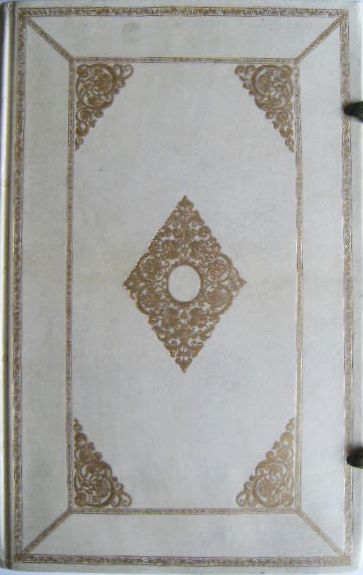 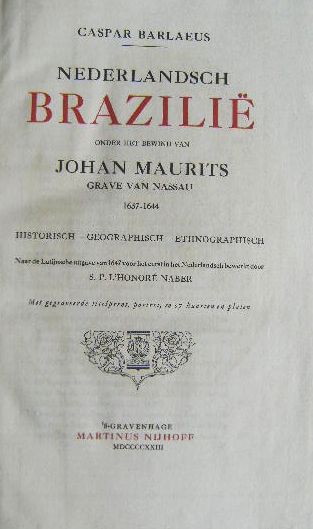 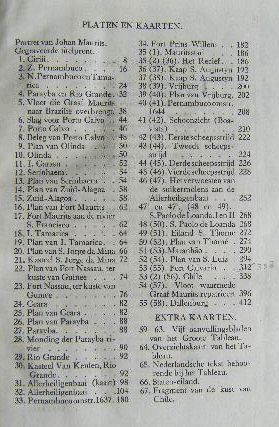 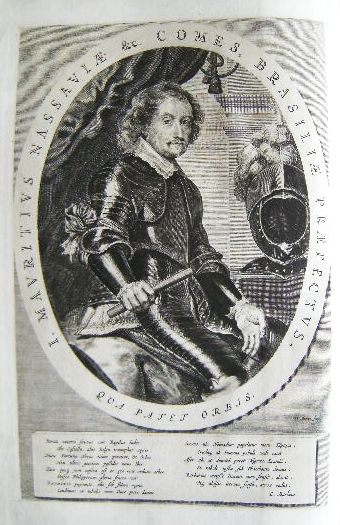
First and only Dutch edition of the most important work on the Dutch period in Brazil, based upon
information given to the author by Johan Maurits van Nassau-Siegen himself. Originally published in Latin in 1647 only a
German translation appeared during the seventeenth century. This Dutch adaptation contains several documents not
included in the contemporary editions, as well as the reproduction of all nine leaves of the great map of Dutch Brazil, of
which only four leaves could be reproduced in the original edition.
Five works of physiocratic inspiration 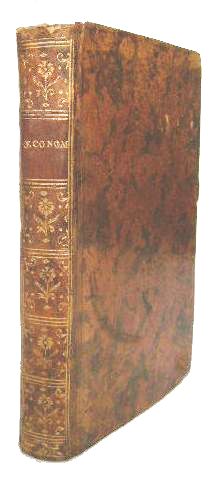 |
BAUDEAU, Nicolas (1730-1792)
Avis aux honnêtes gens qui veulent bien faire. Sur le commerce du bled.
A Amsterdam, chez Marc-Michel Rey. Et se vend à Toulouse, chez Dupleix 1769.
94p. 12mo. Contemp. calf, gilt back with red label, marbled endpapers, red edges, top of back slightly
damaged. Bound with 4 other works. (#35693)
€ 1000 | 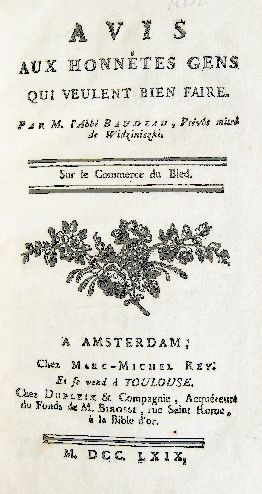 |
A plea for 'better and cheaper bread' urgently needed for the poor population of France after the bad harvest of 1767.
As a Physiocrat Baudeau of course advocates the free trade in grain, despite the decrees of 1764 still not guaranteed. He
adds several proposals for improving the grinding of corn and the baking and distribution of bread. First published in the
Ephemerides du citoyen and again separately in 1768.
*Kress and INED list the 1768-edition only. Not in Einaudi or Goldsmiths'.
Bound with: [BAUDEAU, Nicolas] Avis au peuple sur l'impôt forcé qui se percevoit
dans les halles et marchés sur tous les bleds et toutes les farines. [No place] 1774. 21,[1]p. First edition. A protest
against the decree of 1770 regulating the distribution of bread, according to Baudeau 'raising the taxes on bread for the
people with more than 16 millions a year'.
*INED 272. Goldsmiths' 11163. Not in Kress or Einaudi.
And with: La ferme de Pensylvanie. Les avantages de la vertu. Plan d'instruction pour le peuple; avec
quelques observations sur la liberté du commerce de grains. A Philadelphie, et à Paris, chez Ribou 1775.
XII,96p. First (only) edition. A very rare little book by an unknown author consisting of three essays. The first essay is an
allegorical history of a farm in Pennsylvania named Nobroub (anagram of Bourbon), or 'the happy family',
administered in the same wise way as the state of Pennsylvania. In the second essay the author holds that a criminal while
injuring others above all injures himself, virtue is its own reward. In the third essay the author pleads for free trade in grain,
with several references to the physiocratic Ephémerides du citoyen and Nicolas Baudeau.
*Not found in any of the usual bibliographies of Americana or economics, but it is included in Evans, Early
American imprints 14029.
And with: BAUDEAU, Nicolas. Questions proposées par M. l'Abbé Baudeau, a M.
Richard des Glannieres, sur son plan d'imposition, soi-disant économique. [No place 1774.] 22p. First (only)
edition. A critical discussion of the plan for fiscal reform published by Des Glannieres in 1774.
*INED 294. Goldsmiths' 11164. Not in Kress or Einaudi.
And with: LE CRI de l'agriculture. A Paris, chez Ruault 1775. [IV],129,[3]p. With folding table. On
the importance of agriculture, against the taxation of land and for a moderate taxation of its yield, the introduction of a
relief-fund for 'agricultural accidents', the liquidation of the public debt, a plan for a Royal Bank, against luxury, etc.
*INED 4581. Not in Kress, Goldsmiths' or Einaudi.
BAUDEAU, Nicolas (1730-1792)
Premiere introduction a la philosophie economique; ou analyse des etats policés. Par un Disciple de
l'Ami des Hommes.
Paris, Didot, chez Didot, Delalain & Lacombe 1771 [at end: De l'Imprimerie de Didot, 1769].
XII (paginated [1]-8,[9],X-XII),497,[3 privilege]p. Contemp. calf, back richly gilt with red label, marbled
edges, marbled endpapers, light rubbing. Kept in a custom brown calf box. First and last leaves with some scattered foxing.
(#20207)
€ 3500 | 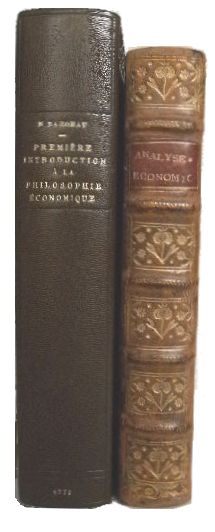 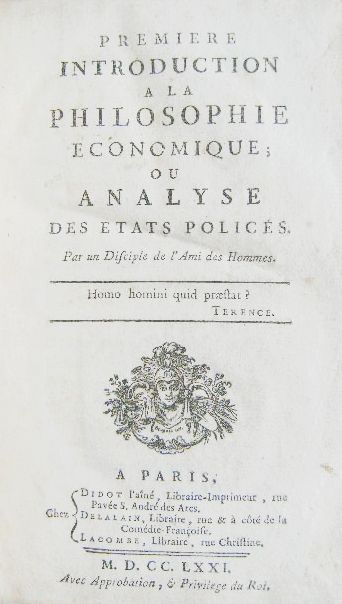 |
First edition. The major book of the author and one of the major textbooks of Physiocracy. The abbé Nicolas
Baudeau began as an enemy of Physiocracy, but in 1766 became an adherent of Quesnay and Mirabeau and 'from then on
proved a most useful popularizer and controversialist as well as an efficient editor'.
*Einaudi 349. Kress S.4657. Mattioli 232. Higgs 5158 ('The best of his works'). INED 291. Schumpeter p.225.
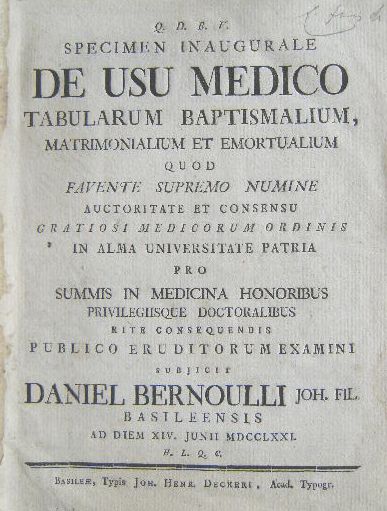 |
BERNOULLI, Daniel II (1751-1834)
Specimen inaugurale de usu medico tabularum baptismalium, matrimonialium et emortualium quod favente
supremo numine auctoritate et consensu gratiosi medicorum ordinis in alma Universitate patria pro summis in medicina
honoribus privilegiisque doctoralibus rite consequendis publico eruditorum examini subjicit Daniel Bernoulli Joh. fil.
Basileensis ad diem XIV. Junii MDCCLXXI.
Basileae, typis Joh. Henr. Deckeri 1771.
Small 4to. 28p. With folding plate. Disbound. (#39438)
€ 500 |
First edition. Doctoral dissertation of the Swiss mathematician Daniel Bernoulli, a pioneering work on the application
of demographic statistics (baptism, marriage and death) on the medical sciences. He refers to the works of a.o. Kersseboom,
Montmort, Süssmilch and Deparcieux.
BOUNIATIAN, Mentor (1877-1969)
Les crises économiques. Essai de morphologie et théorie des crises économiques
périodiques et de théorie de la conjoncture économique. Traduit du Russe par J.Bernard et revu et
mis à jour par l'auteur.
Paris, Marcel Giard 1922.
XVII,388p. Contemp. half cloth, back with red label. (Bibliothèque internationale
d'économie politique) (#17619)
€ 225
First French edition, originally published in Russian in 1915. The author was an Armenian economist. ‘Bouniatian's
theory of cycles and crises has some claims to originality, in particular for having made use of the principle of acceleration
for explaining how an increase in the demand for consumption goods gives rise to a much more intense demand for capital
goods, for resorting to the notion of moving equilibrium, and for pioneering the idea that growth cannot be dissociated from
cycles' (Daniele Besomi, ‘Mentor Bouniatian on cycles and equilibrium', in Structural change and economic
dynamics, volume 18, issue 1, March 2007, p.120-143).
|  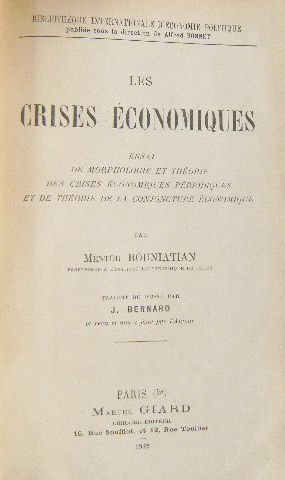 |
[BREDERODE, Lancelot van (1583-1668)]
Vande apostasie. Dat is vanden afval der christenen. Tweede editie. Verbetert en klaerder gestelt.
Gedruct voor den Autheur [1659/60].
[VIII],332,[2]p. Onafgesneden in nieuw leer. (#32625)
€ 600 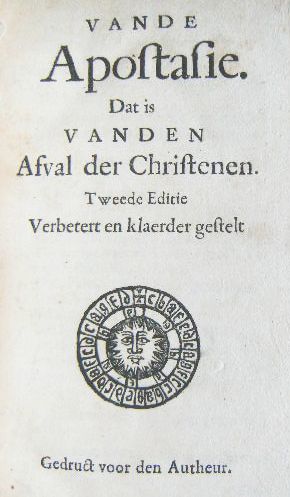 |
Tweede druk. Een eerste druk verscheen hetzelfde jaar eveneens anoniem, maar met vermelding van de naam van de
drukker Jacob Nieuwelingh op de titel. Lancelot van Brederode werd in 1613 benoemd tot raad van het Hof van Holland
maar werd in 1620 ontslagen wegens remonstrantse gevoelens. In dit zijn enige boek bestreed hij gereformeerde
leerstellingen, in het bijzonder die van de erfzonde en de predestinatie. Beschuldigd van socianisme werd dit boek 18
december 1659 verboden door de Staten van Holland en in mei 1661 in Amsterdam 'opgehaald'.
*Knijff & Visser 3033 (met afbeelding). Knuttel, Verboden boeken 33. NCC vermeldt 2 ex. van de eerste
druk (KB en UVA) en 1 ex. van deze tweede druk (UBL).
|  |
BRUN,C.
De redding der bemanning van het Nederlandsch brikschip Nijverheid, verbrand in de Indische zee op 29o 56' Z.
Br. en 43o 38' Lengte beoosten Greenwich; benevens de beschrijving eener reis op de kust en in de binnenlanden van
Oost-Afrika, met statistike en mercantile berigten, betreffende dit weinig bekende gewest.
Rotterdam, bij Mensing en Van Westreenen 1838.
XXIII,[1],389,[3]p. With woodcut vignette of a vessel on title-page. Cloth-backed boards, foxed upper
wrapper laid down. Minor repair to p.XXIII. (#26811)
€ 450 | 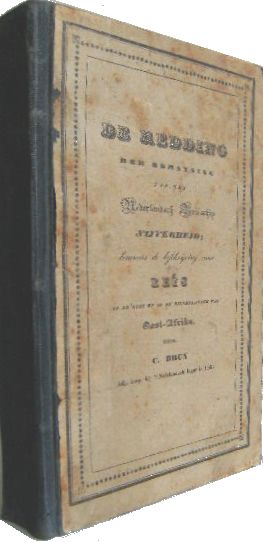 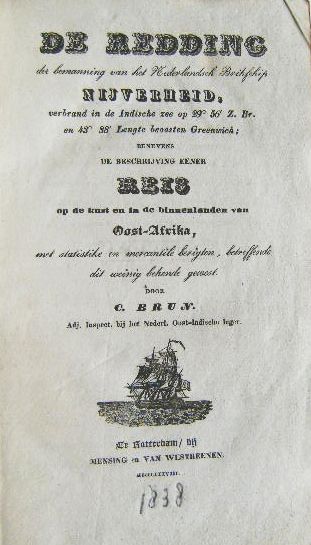 |
First (only) edition. A relation of the wreck of the Dutch brig ‘Nijverheid' before the East African coast and the rescue
of its crew. They arrived at the coast of Mozambique and traveled their way to the cities of Inhambane, Sofala and
Quilimane, to Madagascar and to the islands of Zanzibar, Mafia and Pemba. The author gives ample information about the
places he visited and the residents he met, their skills and habits, etc.
The author was a ‘deputy inspector of the Dutch East-Indian army'.
Code civil.
Code civil des français. Edition originale et seule officielle. [ Bound with:] Table
alphabétique des matières du code civil des Français, rédigée sur l'édition
originale et seule officielle.
A Paris, de l'Imprimerie de la République [ second work:] A Paris, chez Rondonneau An XII - 1804.
2 volumes in 1. 8vo. [IV],436,240p. With vignette on title of first work (‘Grand-juge et ministre de la
justice‘). Contemp. calf, a little stained, remainders of a label, red edges. Title of second work with a stain, a few
contemporary annotations. Bound with some 100 blank leaves. (#39880)
€ 600
First edition in this size, published simultaneously in 4to and 16mo. The drawing up of a Civil Code was assigned by
Napoleon, then First Consul, on 13 August 1800 to a committee of four members (Tronchet, Bigot de Préameneu,
Portalis and Maleville). The committee, with the active participation of Napoleon himself, completed the work already in
1801, but it was not published until 21 March 1804. Its importance not only for France but worldwide, with its stress on
clearly written and accessible law, can hardly be overestimated.
Preceded by: Constitution de la République Française. [At end:] A Maastricht, an VIII.
20p. With vignette on title.
*En français dans le texte 210.
| 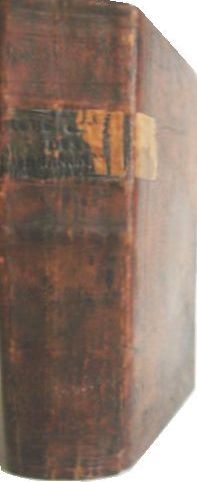 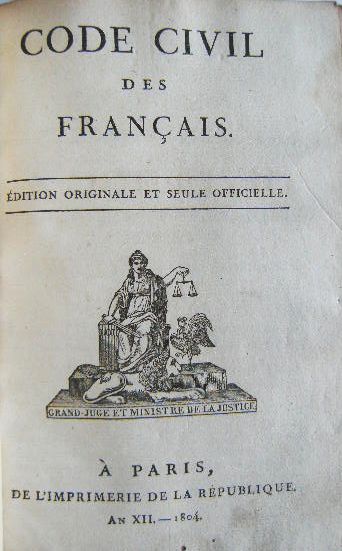 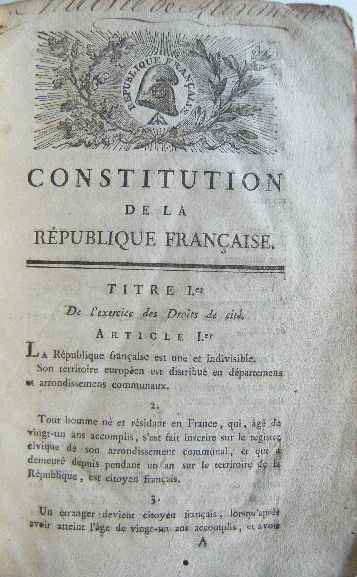 |
The education of the deaf and dumbCZECH, Franz Herrmann (1788-1847)
Versinnlichte Denk- und Sprachlehre, mit Anwendung auf die Religions- und Sittenlehre und auf das Leben.
[ Bound with:] Nothwendigkeit der allgemein einzuführenden Elementar-Bildung der Taubstummen ...
Vienna, gedruckt und in Commission der Mechitaristen-Congregations-Buchhandlung 1836-37.
2 volumes in 1. 4to. XXI,[2 table],[1 blank],25-441,[3 errata]; 33,[3]p. With an engraved frontispiece, 67
plates, 4 maps (2 folding), and numerous woodcut figures in the text. Contemp. half calf, back richly gilt with raised bands,
marbled sides, yellow edges. A very fine copy printed on fine paper. (#29945)
€ 850
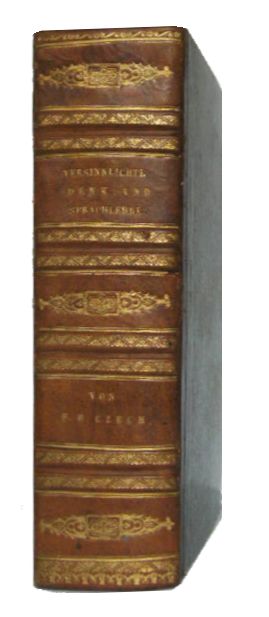 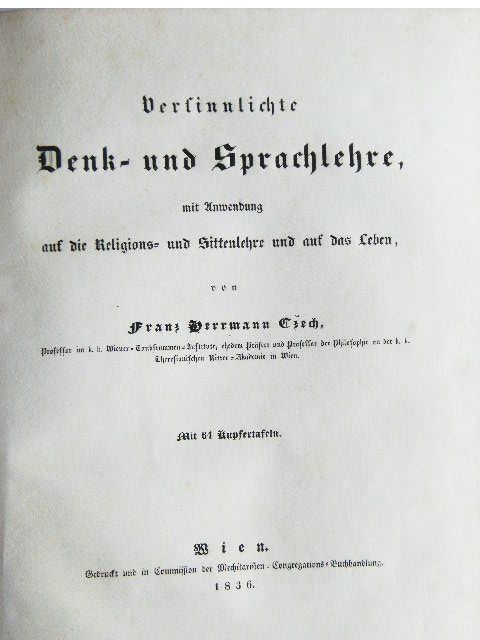 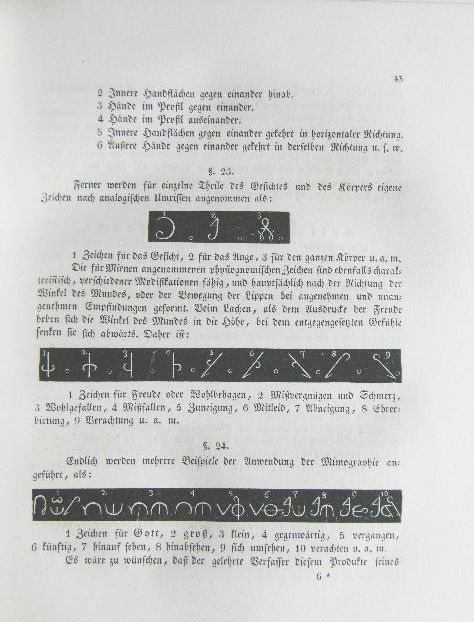 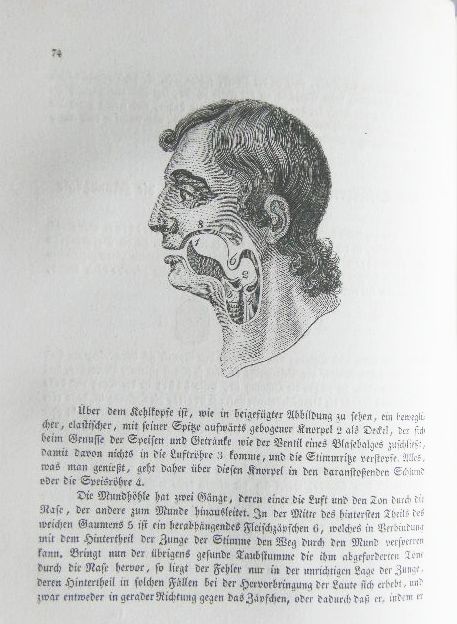 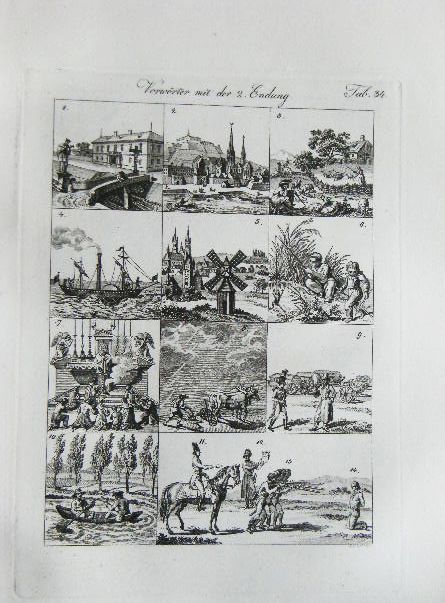
First edition. The first work on the education of the deaf and dumb to attract international attention. It
was published as a help for teaching the deaf mutes, with detailed exposition of the system both in the text and on the
numerous figures or scenes on the fine plates. Czech regarded thinking as a mental activity, innate in each individual.
Articulated speech may make the process easier but is not intrinsically necessary. Czech therefore thought it both morally
and legally a duty to provide education to the deaf and dumb.
Czech had been professor of philosophy at the Theresianischen Ritter-Akademie in Vienna and in 1818 was
appointed professor at the famous Wiener-Taubstummen-Institut. This institute was founded in 1779 by Maria
Theresia after the example of the French Institution Nationale des Sourds Muets of the famous abbé de
l'Epée.
DEFOE, Daniel (c.1660-1731)
A plan of the English commerce. Being a compleat prospect of the trade of this nation, as well the home trade as
the foreign. In three parts. Part I. Containing a view of the present magnitude of the English trade, as it respects, 1. The
exportation of our own growth and manufacture. 2. The importation of merchants goods from abroad. 3. The prodigious
consumption of both at home. Part II. Containing an answer to that great and important question now depending, whether
our trade, and especially our manufactures, are in a declining condition, or no? Part III. Containing several proposals
entirely new, for extending and improving our trade, and promoting the consumption of our manufactures, in countries
wherewith we have hitherto had no commerce. Humbly offered to the consideration of the King and Parliament.
London, printed for Charles Rivington 1728.
XVI,[8],368p. Modern full calf, back richly gilt with red label. (#31225)
€ 3750  |
First edition. Defoe's chief contribution to economics, or economic jornalism. An extensive plea for the promotion of
trade including colonial expansion. ‘More colonies then is, without question, extending the commerce; it is enlarging the
field of action; it calls in more hands to assist in the publick prosperity; it employs profitably the unprofitable numbers of
your poor, and lays a foundation of an extended trade, and thereby of a still larger exportation from home' (p.366).
‘This work is full of information; and, though desultory, it is ably written, and contains sundry passages in which the
influence of trade and industry in promoting the well-being of the labouring classes and the public wealth is set in the most
striking point of view ... it is shown that [the commerce and manufactures] had continued progressively to increase, and
were then, in fact, more flourishing than at any former period.'
*Kress 3744. Goldsmiths' 6594. Mattioli 957. Not in Einaudi. McCulloch p.45. New Palgrave I,p.766.
| 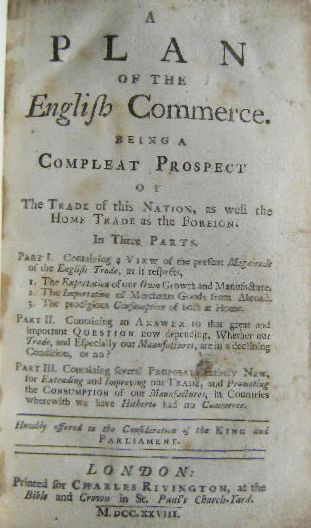 |
One of the major books in the history of probability
theory DEPARCIEUX, Antoine
(1703-1768)
Essai sur les probabilités de la durée de la vie humaine; d'où l'on déduit la
manière de déterminer les rentes viageres, tant simples qu'en tontines: précédé d'une
courte explication sur les rentes à terme, ou annuités; et accompagné d'un grand nombre de tables.
Paris, Guerin 1746.
[VI],[2 approbation, errata, avis au relieur],132p. (including a table on p.102), 22 tables (table 3 on 3
pages, table 4 on 2 pages, tables 6-13 double-page, tables 16-21 half-page), [1 privilege du roi]p. Bound with two additional
pieces. (#29011)
€ 2000 | 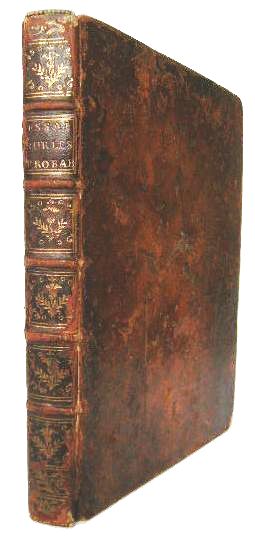 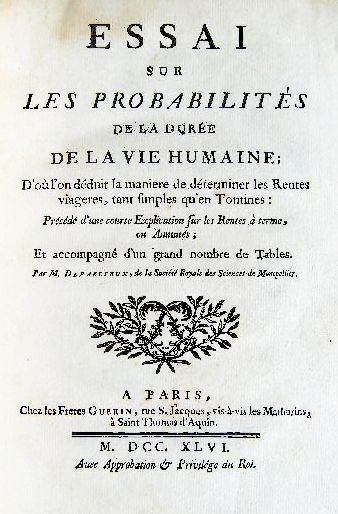 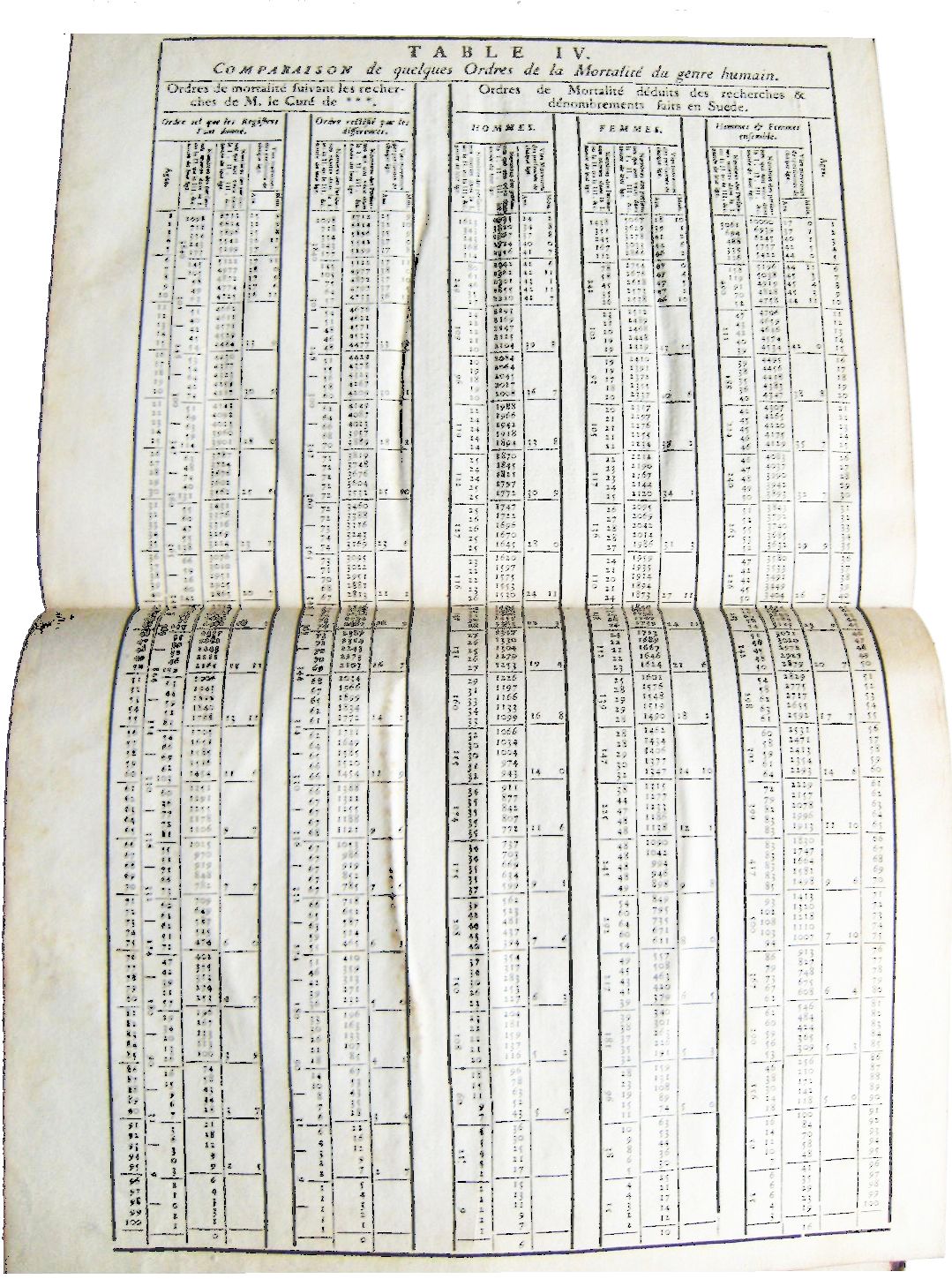 |
Together 3 works in 1 volume. 4to. Contemp. calf, rubbed, extremities worn, joints cracked but holding, gilt back
with red label, red edges, marbled endpapers. Small corner (2 cm) of half title torn away. Small armorial blank stamp
('Charles Anderson') in corner of first blank and half-title. The usual light browning. A very good copy with ample margins.
First (only) edition, with the Objections and Addition, rarely found together. The Essay on the
probabilities of the duration of human life is one of the major books in the history of statistics and probability theory.
Deparcieux had studied various schemes for life insurance, including that developed by the Neapolitan banker Lorenzo de
Tonti, whereby upon the death of a participant his share (or only its dividends) is distributed to the remaining members. For
the construction of mortality tables Deparcieux studied the life expectancy of members of restricted groups like religious
communities, in order to exclude the effects of migration. His tables were used in France for decades.
Deparcieux was a scientist and mathematician, member of the French Academie des Sciences and professor at the
Collège de France. He was also a mechanical engineer with particular interest in hydrodynamics and as such best
known for his project for the supply of water for Paris, the Canal de l'Ourcq, carried out during the Empire.
Followed by: Objections faites à M. Deparcieux ... sur son Livre des probabilités ...
avec les réponses à ces objections [drop title]. [No place or date, privilege at end dated 1746.] 16p.
Followed by: Addition à l'Essai sur les probabilités de la durée de la vie
humaine ... par M.Deparcieux. Paris, H.L.Guerin & L.F.Delatour 1760. 32,[3]p., including 4 tables.
*Kress 4801 and 4801a. Einaudi 1529. INED 1346. McCulloch p.246.
DOYLE, Arthur Conan (1859-1930)
The crime of the Congo.
London, Hutchinson & Co. [1909].
128p. With photographic frontispiece showing Africans with severed hands. Finely bound in later
bordeaux half cloth. Blind stamp from the ‘Munger Africana Library' to half-title. Paper age-toned. Inscribed by the
author on half-title: ‘Yours faithfully/ Arthur Conan Doyle'. (#21532)
€ 750
 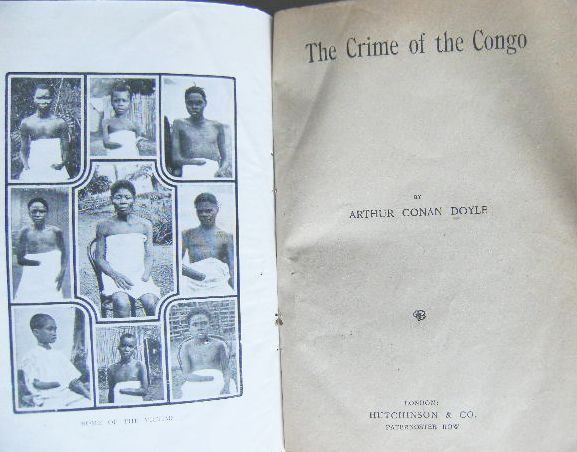 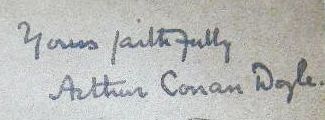
First edition. The campaign against the atrocities in the Congo Free State, at the time a state under the
absolute rule of King Leopold II of Belgium, began in 1890 and reached its apogee after 1900 under the leadership of the
British activist E.D.Morel to whom the present volume is dedicated. In 1908 the Belgian state annexed the territory and
created the Belgian Congo. The conditions for the indigenous population improved dramatically.
Doyle here gives an account of the horrors that have been committed in the last decades and in his introduction he
emphasizes the responsibility of the Belgian State. ‘It may be objected that some of this is ancient history, and that the
greater part of it refers to a period before the Congo was annexed to Belgium on August 10th, 1908. But responsibility
cannot be so easily shaken off. Te Congo State was founded by the Belgian King and exploited by Belgian capital, Belgian
soldiers and Belgian concessionnaires. It was defended and upheld by successive Belgian Governments, who did all they
could to discourage Reformers.'
'Above his English contemporaries on account of his
liberal views on national and international trade ... government interference, medieval corporations and so on'
(J.Schumpeter) GRASWINCKEL, Dirck
(1600-1666)
Placcaten, ordonnantien ende reglementen, op 't stuck vande lijf-tocht, sulcx als de selve van outs tot herwaerts
toe op alle voorvallen van hongers-noot en dieren-tijdt beraemt zijn ende ghedaen publiceeren; ten meerendeels door de ...
Staten van Hollant ende West-Frieslant. By een vergadert ende met verscheyden ghelijck-formighe ordonnantien ende
reglementen, met verdere betrachtingen bevesticht.
Tot Leyden, ter Druckerije van de Elseviers 1651.
2 parts in 1 volume. Folio. [XII],203,175,[1]p. Contemp. vellum. Fine copy. (#16259)
€ 2250 |  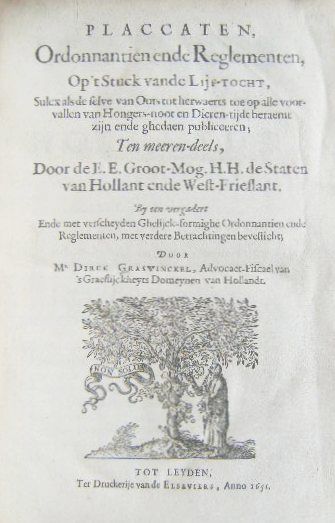 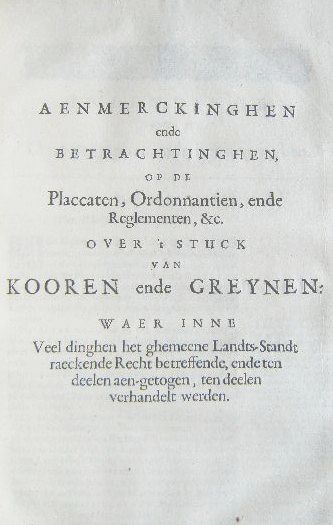 |
First (only) edition. A treatise on the economics of the corn trade that ranks among the best of the scientific
achievements of the Dutch in the seventeenth century.
The first part is a Compilation of regulations concerning foodstuffs, all the ordinances concerning the corn
trade in the Netherlands from 1501 till 1634. They are printed in Dutch and Latin in double columns, with a Dutch half-title
Reglementen op 't stuck van kooren ende greynen.
The second part constitutes Graswinckel's analysis of the processes involved. It is written in Dutch, with some printed
annotations in Latin in the outer margins, and has a half-title Aenmerckinghen ende betrachtinghen, op de placcaten,
ordonnantien, ende reglementen, &c. over 't stuck van kooren ende greynen ... (Remarks and considerations on the
regulations concerning corn and grains).
The author was one of the most prominent lawyers of his time and a strong supporter of republican government. He
had assisted Grotius in Paris and acquired fame on his own account with works on public and international law. With the
present treatise on the economy of the corn trade Graswinckel also established his name as an economist 'with a remarkable
grasp of the subject'. Graswinckel refutes many of the mercantilist views of his time. He strongly defends the interests of the
land owners and the agricultural population and argues for the free trade in corn, only in times of national destitution
restrictions may be imposed. Schumpeter writes that many historians will place him (and his contemporary Pieter de la
Court) 'above their English contemporaries on account of their liberal views on national and international trade ...
government interference, medieval corporations and so on'. Schumpeter also notes that Graswinckel, though his views on
the harm done by prohibiting the exportation of grains were not new in 1651, yet he had 'a keener sense of the price
mechanism involved, especially of the function of forestalling'.
Our copy with a Dutch title-leaf, other copies have a Latin title-leaf Statutorum circa annonam syllabus ..., but
the contents is identical.
*Goldsmiths'-Kress 1201. Dekkers p.66,7. Willems 694 (with Dutch title) and 695 (with Latin title). Liesker p.61 and
262. Schumpeter p.197 and 368. Van Rees I,p.326. Laspeyres p.205 and nr 178. Palgrave II,p.256.
First German editionGROTIUS, Hugo (1583-1645)
Drey Bücher vom Rechte des Krieges und des Friedens, darinnen das Recht der Natur und der Völcker,
wie auch die vornehmsten Sachen desjenigen Rechtes, welches von der Regierung eines Staates handelt, erkläret, und
die Anmerckungen des Verfassers hinzugefüget werden. Aus dem Lateinischen ins Deutsche übersetzet durch
P.B. S[inold] g[enannt] Schütz. Nebst einer Vorrede Herrn Christian Thomasii.
Leipzig, Friedrich Groschuff 1707.
4to. VI,84,[4],1248,[40]p. With an engraved allegorical frontispiece with inset portrait of Grotius, and an
engraved vignette. Contemp. panelled calf, back with gilt lettered label, sprinkled edges, very light wear to upper joint. A
very nice copy. (#31521)
€ 3750 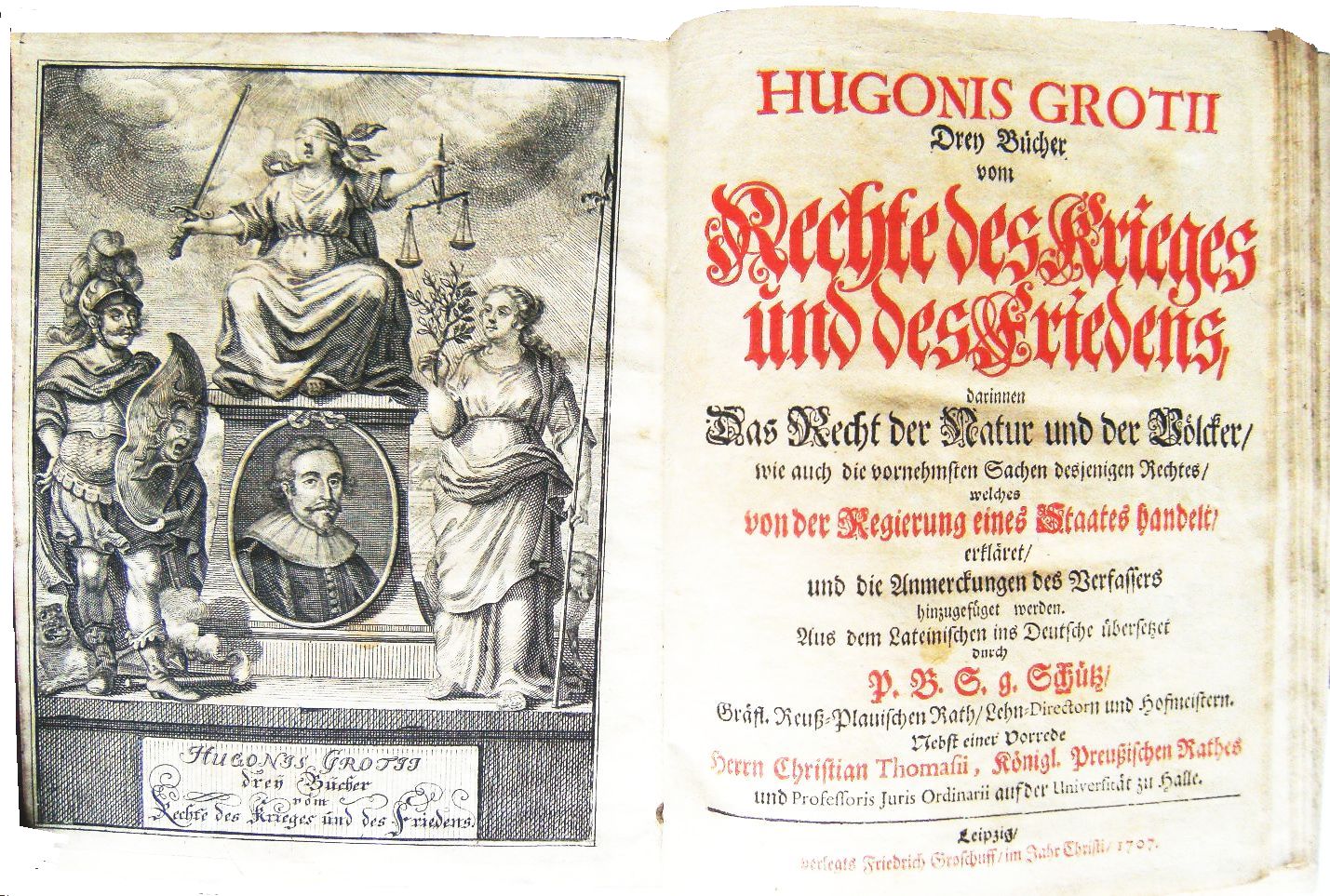 |
First German edition of Grotius' great De jure belli ac pacis (1625). This translation is preceded by a preface
by Christian Thomasius: Von der Historie des Rechts der Natur bis auf Grotium; von der Wichtigkeit des Grotianischen
Werck's, und von dem Nutzen gegenwärtiger Ubersetzung. A second German edition, translated by Johann
Niclas Serlin appeared in 1709. That edition was, contrary to the present, heavily annotated. The translator in his preface to
the present translation however says that he preferred to translate the book unchanged, because the annotations and
comments of other writers often obscure the work rather than clarify it.
*Ter Meulen & Diermanse 662. Printing and the mind of man 125.
| 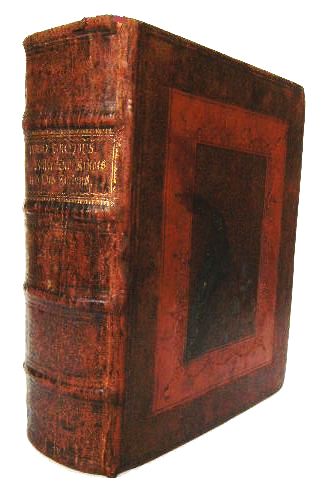 |
HAAGSMA,B.B.
Frysia, of schets der Friesche volkplanting in Noord-Amerika, benevens raadgevingen en wenken voor
landverhuizers, zijnde een vervolg op het werkje getiteld: O. Bonnema en zijne togtgenooten.
Bolsward, P.M.Feenstra [1855].
49p. With lithograph plate and folding lithograph map drawn by the author of the Northeast of the United
States (20 x 44 cm), coloured in outlines, showing several Dutch settlements. Uncut in orig. printed wrappers, frayed, back
covered with brown paper. (#24601)
€ 250
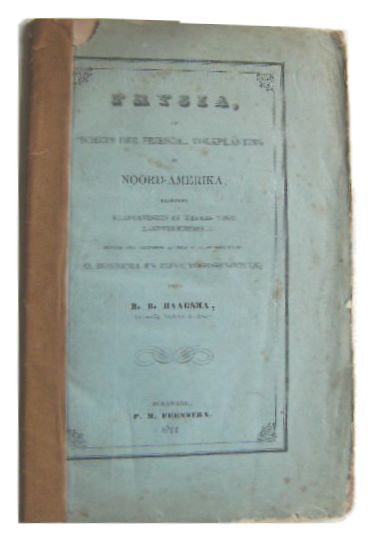 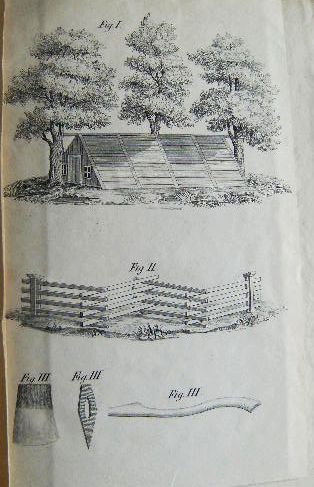 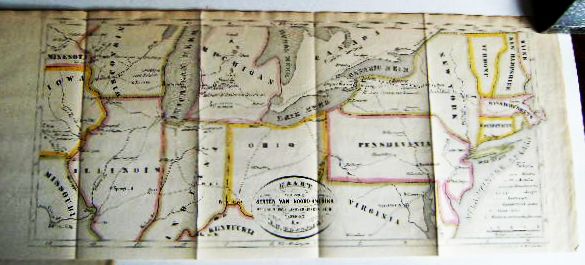
First (only) edition. A concise account of the first year in the colony Frysia (Columbia County,
Wisconsin), now called Friesland, of the author and his fellow settlers, originating from the Dutch province of Friesland. It
was written in the hope ‘that it may serve the emigrant as a useful and faithful guide'. The earlier work of the author quoted
in the title described their voyage to America.
*A few copies in Dutch libraries, but only one outside the Netherlands (Missouri History Museum).
HAYEK, Friedrich August von (1899-1992)
Law, legislation and liberty. A new statement of the liberal principles of justice and political economy.
London, Routledge & Kegan Paul [1973-79].
3 volumes. XI,184; XIV,195; XV,244p. Orig. black cloth with gilt-lettered blue backs, no dust jackets.
Signature on front free endpapers, no other markings. (#20992)
€ 1250 | 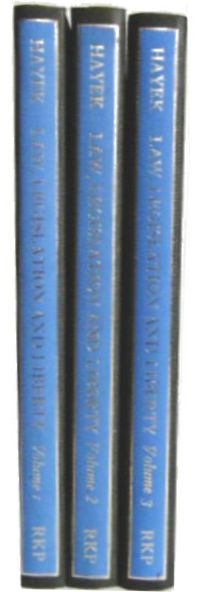 |
First editions. 1. Rules and order. 2. The mirage of social justice. 3. The political order of a free people.
[HEYNITZ (or Heinitz), Friedrich Anton von (1725-1802)]
Essai d'économie politique.
A Bâle [Basel], chez les freres Decker 1785.
4to. [II],45p. With 4 very large folding tables. Title with fine engraved view. Printed within two-line
borders. Contemp. half calf, gilt back with gilt-lettered red label, speckled boards, red edges, marbled endpapers. Fine copy.
(#30752)
€ 1500 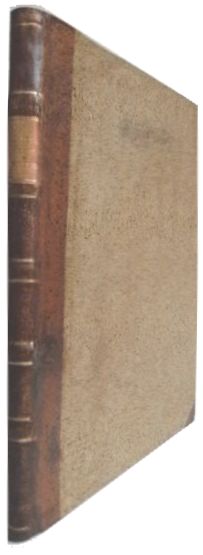 |
First edition. A rare book in which the author sketches the economy of a (fictitious) state, its population and its
distribution among the various classes, its agricultural production and needs to feed the population, the income and
expenditure of the various classes and of the state, etc. Apart from a treatise on mineral production in Prussia this is is only
work.
The author was a mining engineer and acquired fame as the reformer of the mining industry in Saxony and Prussia.
He was one of the founders of the Bergakademie (Technical University) of Freiberg, the oldest university of mining and
metallurgy in the world.
A German edition (Tabellen über die Staatswirthschaft eines europäischen Staates der vierten Grösse,
nebst Betrachtungen über dieselben) was published the next year.
*INED 2239. Not in Kress, Goldsmiths', Einaudi, Mattioli or Humpert.
| 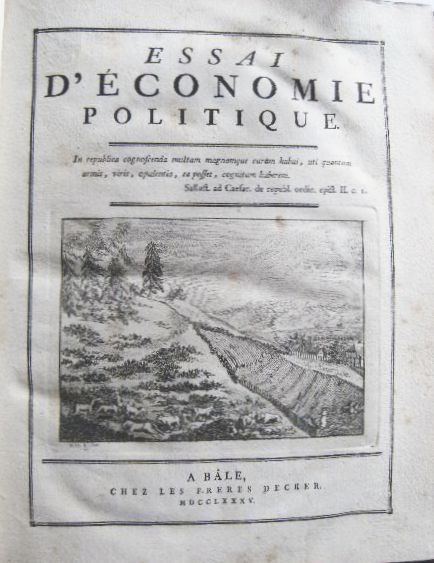 |
The logical abacusJEVONS, William Stanley (1835-1882)
The substitution of similars, the true principle of reasoning, derived from a modification of Aristotle's Dictum.
London, Macmillan and Co 1869.
Small 8vo (16,5 x 11,5 cm). VIII,86,[2],42[publ. cat., dated 1870],[2]p. With frontispiece of ‘The logical
abacus'. Orig. blue cloth, little rubbed, back gilt-lettered, small stain at foot of back and foot of front side. Small circular
stamp on front free endpaper. (#40939)
€ 3500
First edition. The second of Jevons's works on logic, the first being Pure logic (1864), in which he developed
his logical abacus. He described a working model of a mechanical computer, a logic machine that could perform simple
logical inference by manipulating a truth table consisting of labeled wooden boards, called ‘logic piano' because of its
resemblance to an upright piano.
|  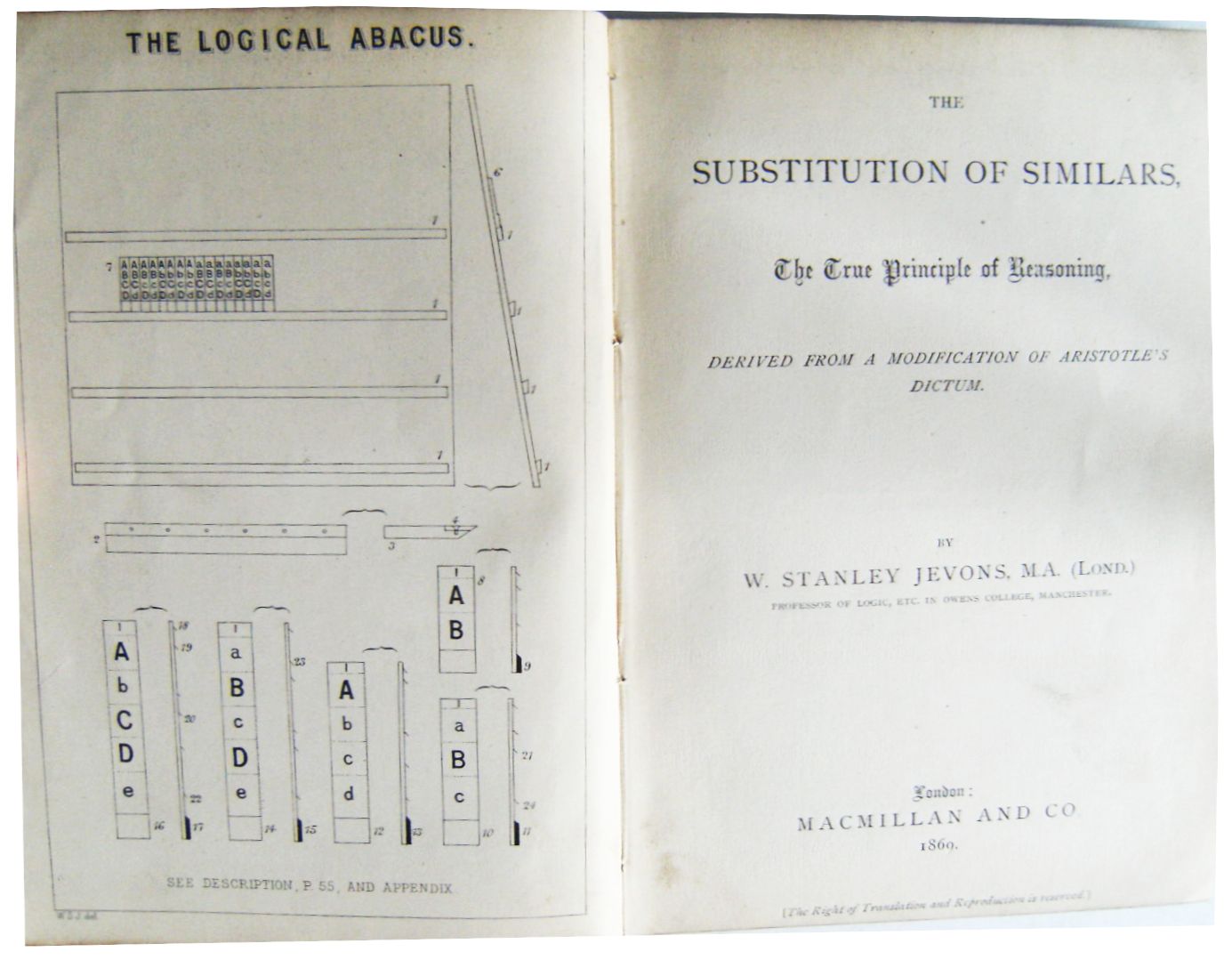 |
JORIS, David (c.1501-1556)
t'Wonder-boeck: waer in dat van der werldt aen versloten gheopenbaert is. Wie een der ick (segt de Heere)
senden sal, ontfangt in mynen naem, die ontfanght my: wie my ontfanght, ontfanght den die my ghesonden heeft.
Hoochghelovet moet hy sijn, die als een ambassatoer ghesonden komt, inden name des Heeren. Opt nieuw ghecorrigeert
unde vermeerdert by den autheur selve: int jaer 1551.
[Rotterdam, Dirck Mullem c.1595.]
4 parts in 1 volume. Folio. [X],125,[2,1 blank]; [VI],164,[2]; [IV],50,[1,1 blank]; [II],34,[1] lvs. With 3
full-page engravings, 2 signed 'IRW' (Hieronymus Wierix), a large woodcut in the first part, 3 large woodcuts in the fourth
part, a few smaller woodcuts, and numerous woodcut initials. Scattered old annotations and striping, annotations to first and
last blanks. Mostly marginal staining, particularly in the upper inner corner in the first and last part. Printed in double
columns. Part 2, lvs 33-36 bound after 39; lvs 91-93 after 94. Contemp. calf over wooden boards, minor imperfections,
richly blind tooled, once rebacked and recased, brass corners to both boards (1 gone), remnants of clasps, and center piece
to front board (gone from back board). (#35734)
€ 4500
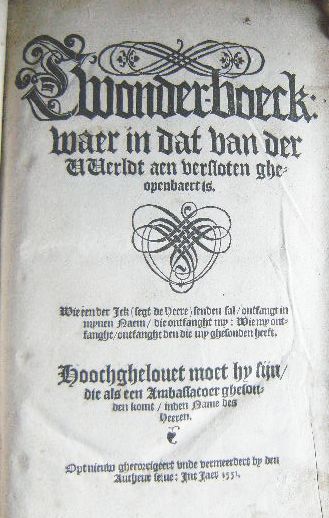  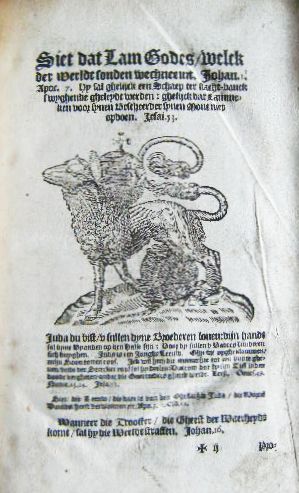 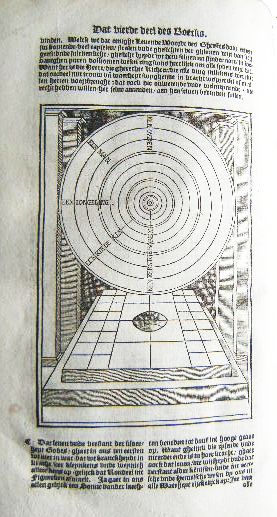 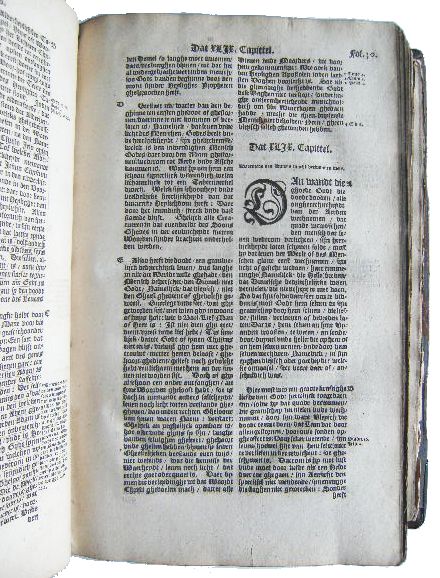
Third edition, a literal reprint of the much enlarged second edition published in 1584 in Vianen by the
same printer. Both the second and the third edition were published without name of place or printer and were dated 1551,
no doubt because of its hazardous contents. First published in 1542-44 in Deventer by Dirk van Borne.
The Book of miracles is the chief book of David Joris, a glasspainter by trade and the most important leader
of Dutch anabaptism in the 1530's after the debacle of Munster. He strongly rejected violence and consistently advocated a
peaceful approach, but he also represented a dangerous mysticism which could, and indeed did among some of his many
followers, result in libertinism. Joris book provoked a heated dispute with Menno Simons, who considered him a false
prophet, 'deceiver and falsifier of the divine truth' in stead of holding to the Scriptures. Joris also defended unrestricted
religious liberty and during his stay in Basel stood up for the pitiable Michael Servetus. Not surprisingly he was a long-life
fugitive, and though he was buried with full honors in Basel his corpse and his books were publicly burned three years
afterwards.
*Van der Linde 58. TB 5644.
KOOPMANS, Tjalling Charles (1910-1985)
Tanker freight rates and tankship building. An analysis of cyclical fluctuations.
Haarlem, F.Bohn & London, P.S.King 1939.
XII,219,[2]p. With 3 folding charts at end. Orig. grey printed wrappers. Stamp (‘Deutsche
Weltwirtschaftliche Gesellschaft e. V.') below the imprint, another stamp (‘Ter recensie') on half-title and at head of upper
wrapper, remainders of a label at foot of back. (#19691)
€ 350 | 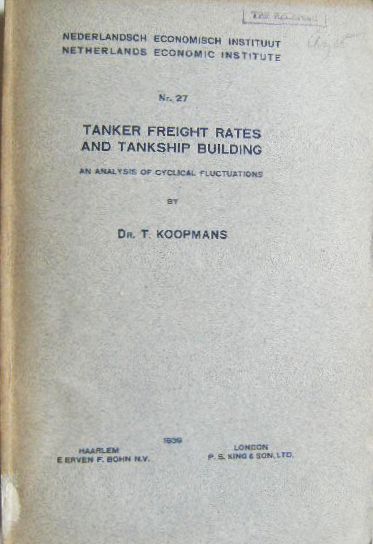 |
First edition. Second book of the author, Noble Prize winner in economics in 1975, dealing with business cycles, the
major macroeconomic issue of the 1930's. It was preceded by his doctoral dissertation of 1936 only. Published as volume
27 of the Netherlands Economic Institut.
*New Palgrave III, p.62-67.
LAW, John (1671-1729)
Oeuvres complètes. Publiées pour la première fois par Paul Harsin.
Paris, Librairie du Recueil Sirey 1934.
3 volumes. Large 8vo. LXXXVIII,[4],222; [IV],327; [IV],432p. With plate to volume 1. Uncut and
unopened in orig. printed wrappers. (#16241)
€ 1250
The original imprint of the only critical edition of the works of the Scottish financier and inventor of the
Mississippi scheme, with an introduction by the editor.
1. Introduction critique. Money and trade considered, texte anglais et traduction nouvelle. Mémoires
sur les monnaies et sur la banque 1705-1712.
2. Mémoires sur les banques et sur le commerce 1715.
3. Le système 1716-1720. Les mémoires justificatifs. L'Histoire des finances pendant la
Régence.
| 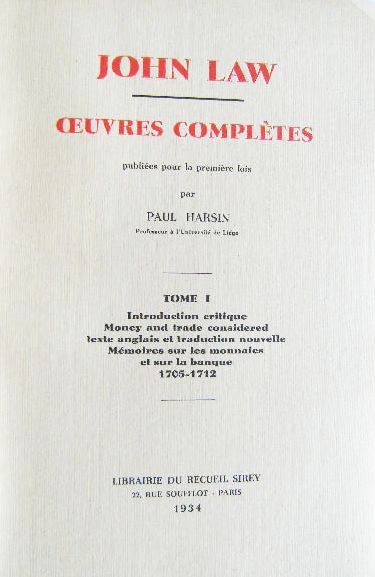 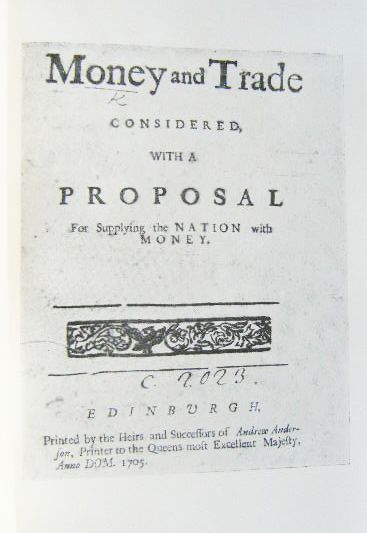 |
LENIN [Vladimir Ilyich Ulyanov] (1870-1924) & [Petr MASLOV
(1867-1946)]
Ob agrarnoi programme. Otvet na kritiku nashego proekta programmy. [ At head:] X. Zum
Agrarprogramm. - Lenin. Antikritik.
Zheneva, Ligi Russkoï Revoliutsionnoï Sotsial-demokraticheskaia Rabochaia [Geneva, League of
Russian Revolutionary Social-Democratic Workers] 1903.
Small 8vo (17,5 x 11 cm). [II],42,[4]p. Small margins, but no loss. Title with small paper flaw in inner
margin of title, no loss of text. Contemp. cloth-backed marbled boards. Preceded by a work by Friedrich Engels. (#28552)
€ 850
First edition. Published in the year of the split between the Bolshevik faction headed by Lenin and the Menshevik
faction headed by Julius Martov. The present discussion on the agrarian program, Lenin defending nationalization and
Maslov municipalization of the land, was ‘one of the main issues that divided both parties'.
*Zaleski 1457. Dekker & Nordemann Antiquarian Department, Catalogue 26 (1980): The two Russian
revolutions. The libraries of Leon Bernstein and Boris Souvarine 746.
Bound with: Friedrich ENGELS (1820-1895) Krest'ianskii vopros vo Frantsii i Germanii. [Translated
from the German by V.Perovaja. Edited and with the foreword by G.V.Plekhanov.] [At head:] Die Bauernfrage in
Frankreich und Deutschland. Zheneva, Rossijskoj Social'demokraticeskoj Rabocej Partii [Geneva, Russian Social
Democratic Workers' Party] 1904. 40p. Stamp on title.
First Russian edition. Originally published as an article in Die Neue Zeit, volume 12, 1894-95, p.292-306.
*Zaleski 1594.
|  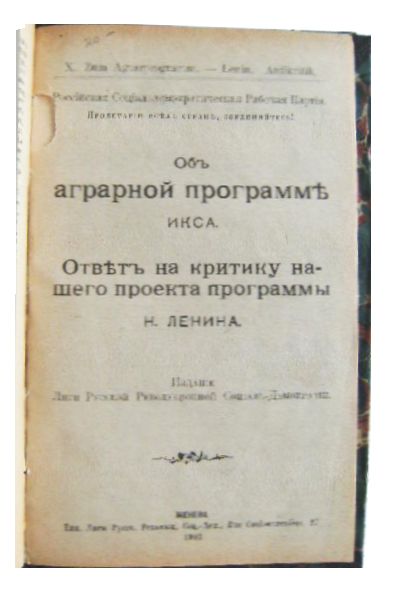 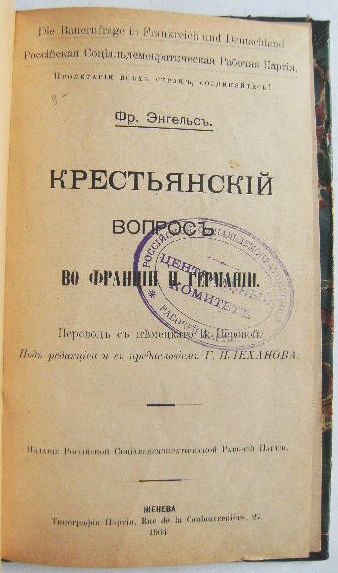 |
LENIN [Vladimir Ilyich Ulyanov] (1870-1924)
Vpered [ at head:] En avant. Nr 1-18 [all published]. [ And:] Proletarii [ at head:] Le
prolétaire. Nr 1-26 [all published].
Zheneva, Rossijskoj Social'demokraticeskoj Rabocej Partii [Geneva, Russian Social Democratic Workers' Party]
1905.
Large folio (44 x 30 cm). Issues between 4 to 8 pages. Bound in 1 volume half cloth, one issue loosely
inserted. Printed in triple columns on varying types of paper. (#14014)
€ 5000
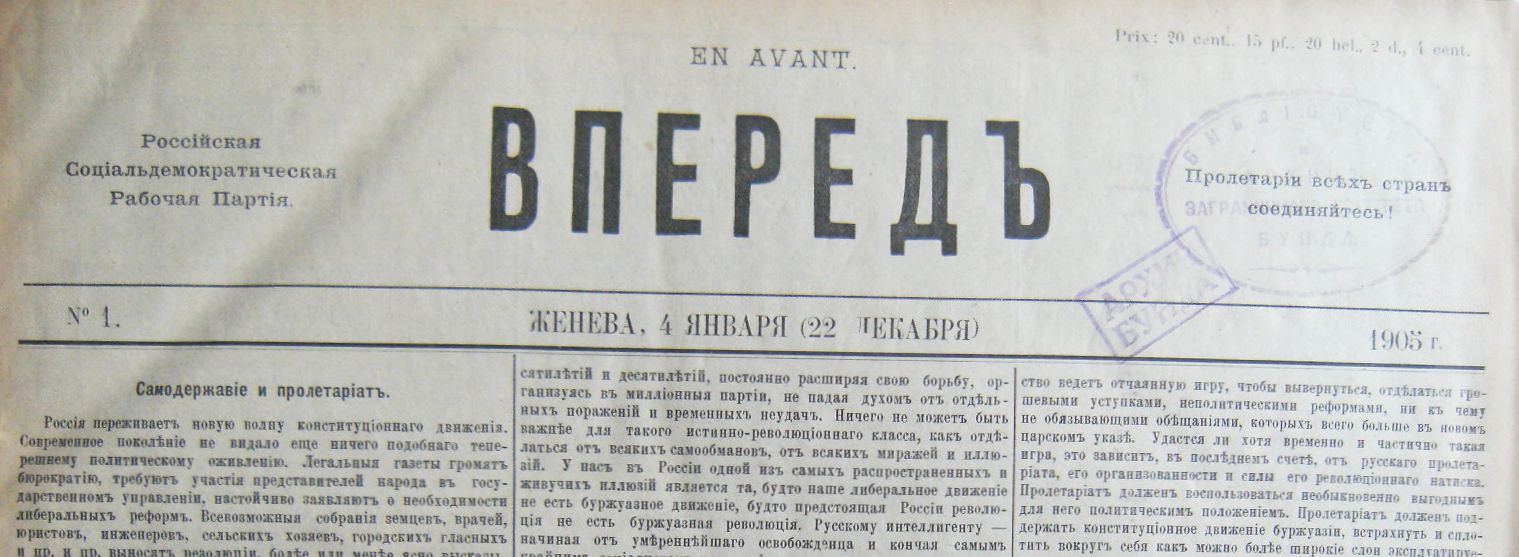 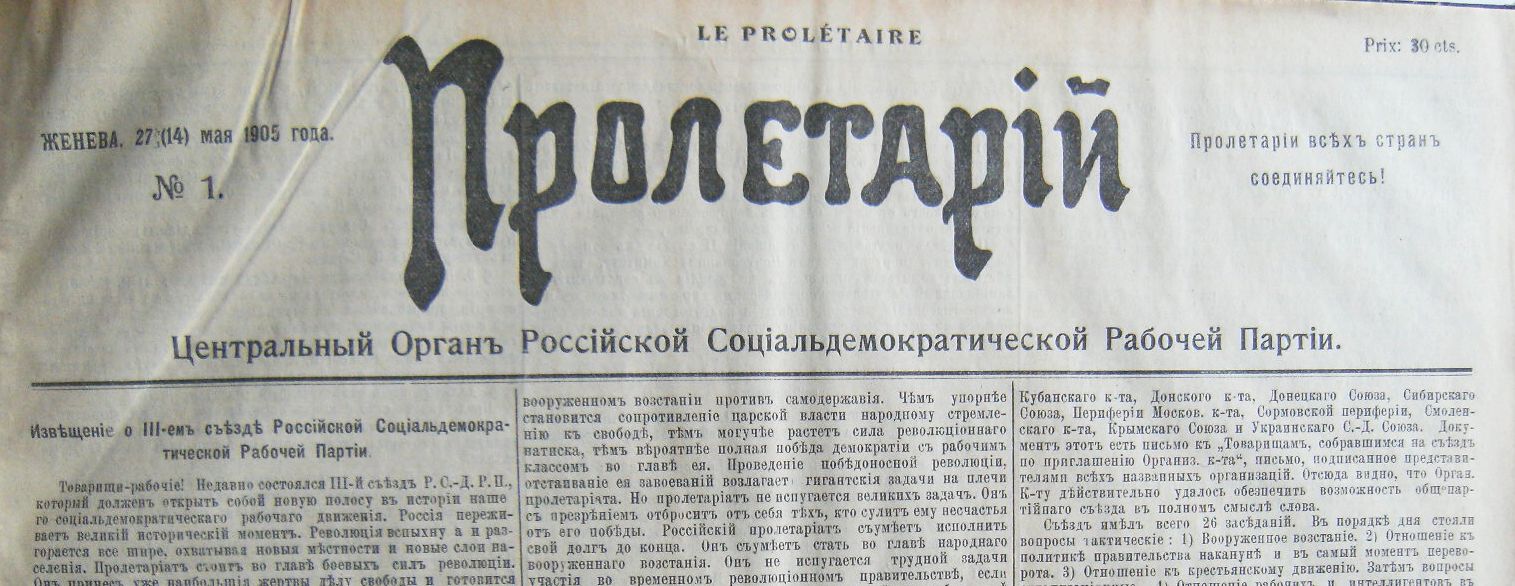
Complete runs of these weekly Bolshevik newspapers published in Geneva. After the Second Congress
of the Russian Social Democratic Labour Party in 1903 the Mensheviks seized control of its journal Iskra. In
December 1904 Lenin and his comrades Vorovskii, Lunacharskii and Krupskaia decided to publish a new journal. It
continued the revolutionary tradition of the Iskra and played an important role in the fight against Menshevism. It
was the first Bolshevik weekly newspaper. Lenin contributed many leading articles. The Vperedwas published from
January 4 to May 5, 1905. It was continued by the Proletarii, from May 27 to November 25.
‘The significance of Vpered in the history of the CPSU is defined by the fact that the paper was an
ideological-political organ abroad that cooperated with the practical organ in Russia - the Bureau of Committees of the
Majority - to give political and organizational shape to Bolshevism. Vpered played an outstanding role in the
struggle against Menshevism, the creation of a new kind of party, and the preparation of the Third Congress of the RSDLP.
At its 22nd session, the Third Congress instructed the Central Committee to establish a new central organ of the party; it
was to be called Proletarii. In a special resolution concerning Vpered, the congress took note of the paper's
role and significance and expressed its gratitude to the editorial board for its pioneering and energetic revolutionary activity
(KPSS v rezoliutsiiakh, 7th ed., part 1, 1954, p.86).'
*Zaleski p.332 & 325. Dekker & Nordemann Antiquarian Department, Catalogue 26 (1980): The two Russian
revolutions. The libraries of Leon Bernstein and Boris Souvarine 753 & 754.
LIST, Friedrich (1789-1846)
National system of political economy. Translated from the German by G.A.Matile. Including the notes of the
French translation, by Henri Richelot. With a preliminary essay and notes, by Stephen Colwell.
Philadelphia, J.B.Lippincott 1856.
LXXXIV,61-497p., thus complete. Contemp. cloth, back with printed label, inner hinges clumsily
repaired, some light wear. (#30948)
€ 600  |
First English edition, originally published in 1841. Friedrich List's seminal advocacy of economic nationalism,
derived from the nationalist and romantic ideas of Alexander Hamilton and Adam Müller, from whom List also
adopted his opposition against the ideas of Adam Smith. List considered the principle of free-trade detrimental to the
national interest, to which the immediate interests of groups and individuals should be submitted. To List the nation was an
entity whose aim is not the creation of wealth by international exchange, but the development of its own economic and
productive sources.
‘These views coincided so exactly with the reawakening of German nationalism that Lists's book caused a great
sensation when it was published, and it remained for seventy years the theoretic gospel of the advocates of protectionist
tariffs in Germany, Britain and the United States.'
The editor Stephen Colwell (1800-1871) was a Philadelphian industrialist and philanthropist.
*New Palgrave III,p.216-218.
| 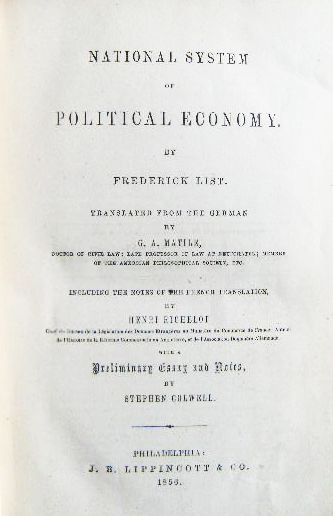 |
LUXEMBURG, Rosa (1871-1919)
Die Akkumulation des Kapitals. Ein Beitrag zur ökonomischen Erklärung des Imperialismus.
Berlin, Buchhandlung Vorwärts Paul Singer 1913.
[VIII],446,[2]p. Orig. half green calf, gilt back with red label, marbled sides, edges and endpapers. One of
a limited number of copies bound by the publisher in a luxurious binding. (#14071)
€ 750  |
First edition. Rosa Luxemburg's major contribution to Marxian economic theory. The significance of it lies in the
proposition of the accumulation of capital as a result of a growing market, thus declaring capitalism unable to produce
economic growth without having access to pre-capitalist markets.
Luxemburg was convinced of the rightness of Marx's economic preoccupations and thought that Marxism could only
be developed in its details. Aiming at compiling a manual of Marxian economics she yet faced unexpected problems in
finding an orthodox-Marxian answer for the problem of the objective limits to capitalist development. However it took her
only four months of flushed writing to solve the problem, and she handed her manuscript to her publisher ‘without even
reading it'.
*New Palgrave III,p.253-255.
|  |
The Great Quarto, virtually a new book MALTHUS, Thomas Robert (1766-1834)
An essay on the principle of population; or, a view of its past and present effects on human happiness; with an
inquiry into our prospects respecting the future removal or mitigation of the evil which it occasions. A new edition, very
much enlarged.
London, printed for J.Johnson 1803.
4to. VIII,[4],610p. Contemp. calf, rebacked to style, boards rubbed but neatly reconsolidated. Stamp on
title, occasional foxing, mostly limited to the first and a few other quires, two pages with a marginal tear. A good copy.
(#20777)
€ 3000 | 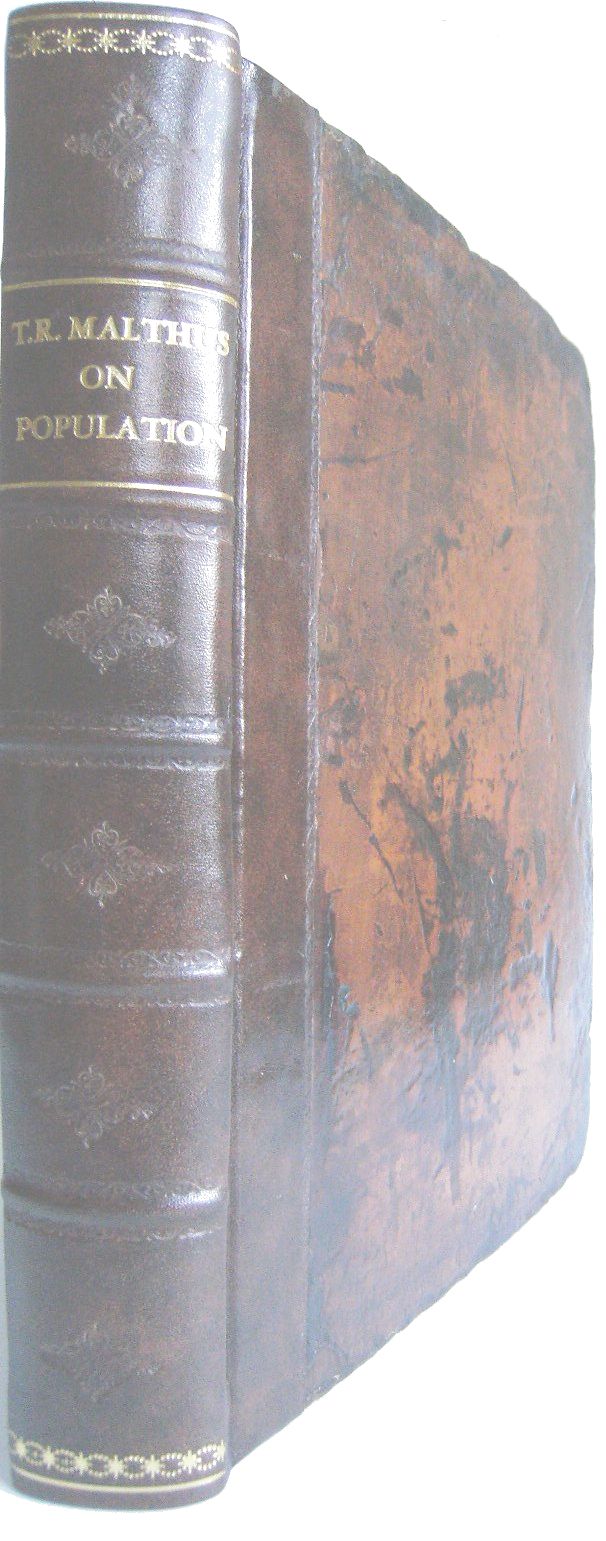 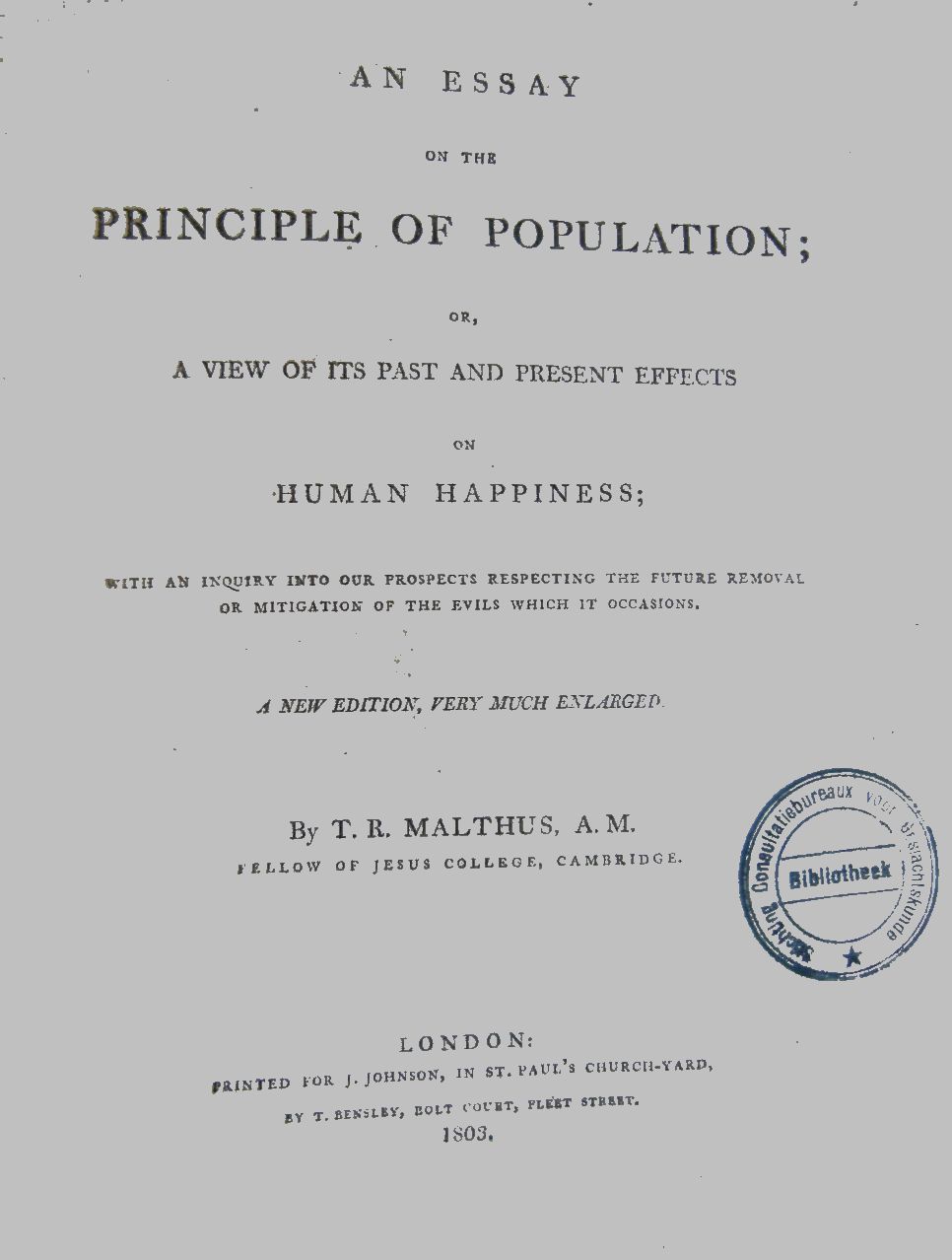 |
Second edition, the so-called ‘great quarto'. This edition was thoroughly and drastically revised and was practically a
new book. The first edition of 1798 was an octavo volume counting 400 page only; it was published anonymously.
MARX, Karl (1818-1883)
Das Kapital. Kritik der politischen Oekonomie. Herausgegeben von Friedrich Engels.
Hamburg, Otto Meissners Verlag 1903-1904.
3 volumes in 4. Orig. half calf, backs richly gilt, marbled sides, orange endpapers, marbled edges.
Bookplate to front paste-downs, old signature in lower outer corner and a very small number in upper corner of front of free
endpapers. An attractive set. (#30988)
€ 750 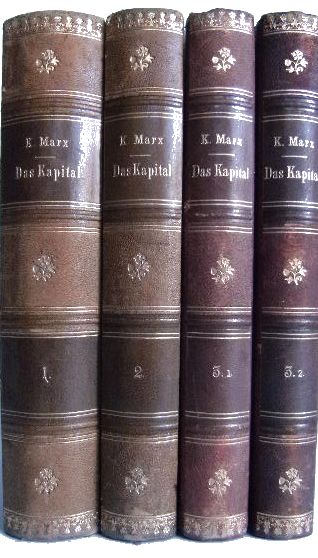 |
Erster Band. Buch I: Der Produktionsprocess des Kapitals. Fünfte Auflage.
Zweiter Band. Buch II: Der Cirkulationsprocess des Kapitals. Dritte Auflage.
Dritter Band, erster [und] zweiter Theil. Buch III: Der Gesammtprocess der kapitalistischen Produktion. Zweite
Auflage.
| 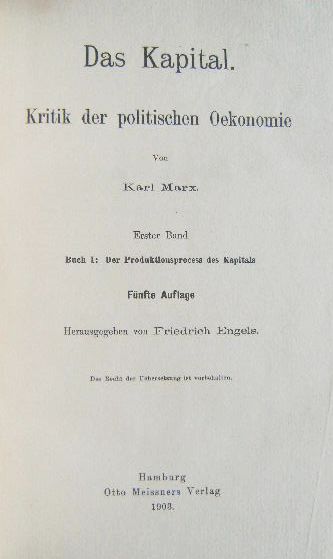 |
MARX, Karl (1818-1883)
Das Elend der Philosophie. Antwort auf Proudhons ‘Philosophie des Elends'. Deutsch von E.Bernstein und
K.Kautsky mit Vorwort und Noten von Friedrich Engels.
Stuttgart, Druck und Verlag von J.H.W.Dietz 1885.
XXXVI,[4],209p. Contemp. half cloth, marbled sides, gilt-lettered back, some light wear. Paper mildly
age-toned as may be expected. A very good copy. (#23436)
€ 900 |  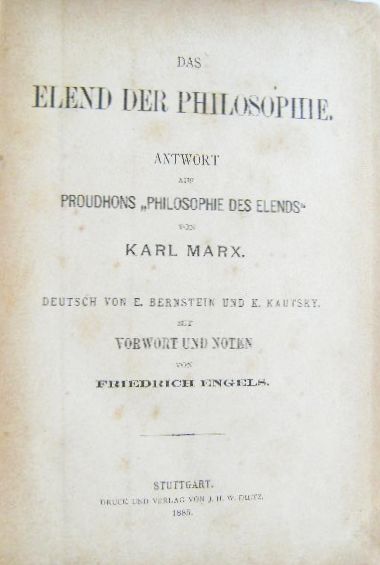 |
First German edition of Marx' vicious refutation of Proudhon's Misère de la philosophie (1847), with
the first edition of Engels' preface and notes.
*Erstdrucke p.11. Rubel 55.
 |
MARX, Karl (1818-1883)
Kritika nekotorykh polozhenii politicheskoi ekonomii. (Zur Kritik der politischen Oekonomie.) Perevod s
nemetskogo P.P.Rumyantsev. Pod redaktsionnyy [i s predisloviyem] A.A.Manuilov. [At head:] Izdanie Vladimira
Bonch-Bruevicha.
Moskva, tipografiya E.Lissnera i Y.Romana 1896.
XII,[IV],16p. Somewhat later half green cloth, mabled boards, back label removed. Name on title, dated
Moscow 1930. (#13205)
€ 2750 | 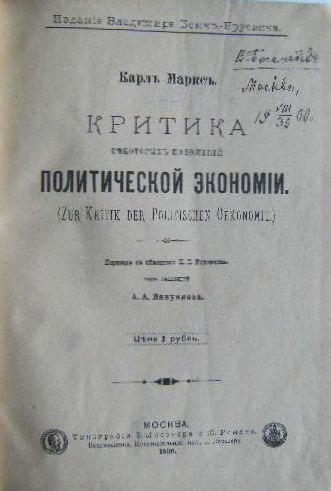 |
First Russian edition, second issue (?). This Russian translation was the first into any language. A French edition
(Critique de l'économie politique) was published in 1899, an English translation followed not before 1904. It
was Marx's first attempt at a draft for a comprehensive theory of the capitalist economy, and he himself described Das
Kapital of 1867 as a continuation of it.
It was edited with a preface by Alexander Appolonovich Manuilov (1861-1929), a Russian economist and politician,
one of the founding members of the Constitutional Democratic Party and rector of Moscow State University between 1908
and 1911. He was appointed minister of education in the First Provisional Government and after the Bolshevik revolution a
director of the Russian State Bank (Gosbank).
There are two issues of this, both have Vladimira Bonch-Bruevicha as publisher at head of the title, both are dated
1896 and have the same collation. The present issue has Lissnera and Romana, another issue has V.S.Traugot as printer at
the bottom of the title. The present issue has on the verso of the title a notice from the censor dated 13 April 1896, in the
Traugot issue it is dated 20 December 1895. WorldCat records quite a number of copies of the present, but only two of the
Traugot issue (UB Freiburg and SB Berlin).
*Rubel 529.
MARX, Karl (1818-1883) & Friedrich ENGELS
(1820-1895)
Le manifeste communiste. Traduction nouvelle par Charles Andler. Avec les articles de F.Engels dans la
Réforme (1847-1848).
Paris, Société nouvelle de librairie et d'édition (Librairie Georges Bellais) 1901.
Small 8vo. 97,[2]p. Orig. printed orange wrappers. (Bibliothèque socialiste. No 8.) (#17628)
€ 750 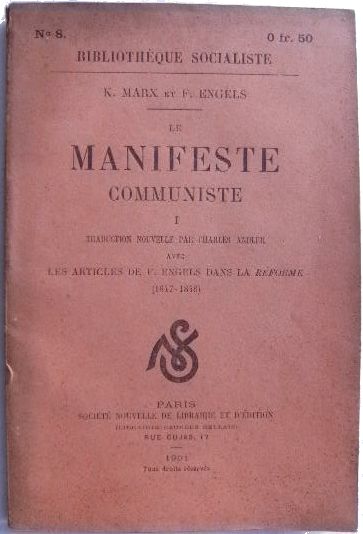 |
First edition of the second French translation. The translation was done after the fourth German edition of 1890. It has
the preface of Marx and Engels to the second edition of 1872, Engels' prefaces to the editions of 1883 and 1890, and
appended La collaboration de Frédéric Engels à la Réforme de Flocon et de
Ledru-Rollin.
A first separate French edition, translated by Laura Lafargue, was published as an offprint from the journal Ere
nouvelle in 1895. That edition was followed the next year by a Brussels edition and in 1897 by a new Paris edition.
*Andréas 394. Rubel 70.
| 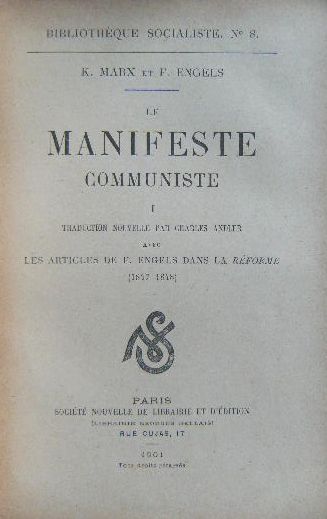 |
MENASSEH BEN ISRAEL (1604-1657)
De creatione problemata XXX: cum summarijs singulorum problematum, & indice locorum Scripturae, quae hoc
opere explicantur.
Amstelodami, Typis & sumptibus auctoris [Amsterdam, by the author] 1635.
Small 8vo (15x9,5 cm). [XVI],156,[2]p. Contemp. vellum. Mild browning. Stamp on title and verso.
Bookplate of Karin Figala. (#32556)
€ 2750  |
First edition. Printed in his own press, the first Hebrew printing press in Amsterdam founded by Menasseh Ben Israel
in 1626, ‘a turning point in the history of Hebrew printing'.
On the title as printer's mark the well-known magic square, divided into 9 squares in which the consonants are
arranged in such a way that the same three Psalm words can be read both horizontally and vertically (Psalm 85 vs 11
‘Veritas e terra orietur/ Truth shall spring out of the earth').
Previously part of the collection ‘Museum Rem. Faesch Basil', founded by the Swiss jurist and art collector Remigius
Faesch (1595-1667), stamp on title verso and ex-dono inscription on first blank dated 1647. Karin Figala (1938-2008) was
an Austrian historian of chemistry and alchemy and professor at the University of Munich.
| 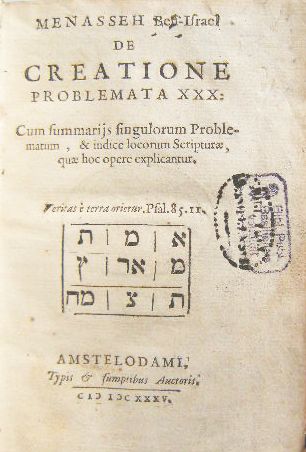 |
MESLIER, Jean (1664-1729)
Le testament de Jean Meslier, curé d'Etrepigny et de But en Champagne, décédé
en 1733. Ouvrage inédit précédé d'une préface, d'une étude biographique
etc. par Rudolf Charles [d'Ablaing van Giessenburg].
Amsterdam, à la librairie étrangère raison R.C.Meijer 1864.
3 volumes. [IV],LXIV,352; [IV],400; [IV],410p. Modern marbled wrappers, backs with printed label. Last
leaf of each volume age-toned. An uncut and entirely unopened set. (#27166)
€ 1500 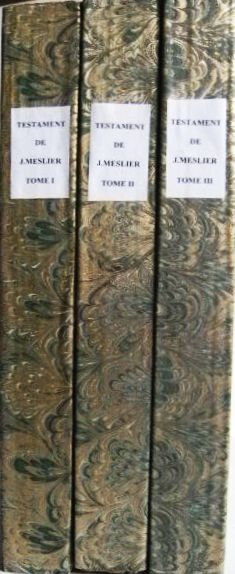 |
First complete edition of Meslier's Testament, notoriously rare. Parts of it were published earlier by Voltaire,
Holbach and Sylvain Maréchal, but these concerned merely Meslier's ideas towards religion. The present edition is
of striking importance, as it has printed for the first time Meslier's socialist theories. Meslier's work ‘has a considerable
impact and is certainly the most remarkable monument of eighteenth century socialism ... nobody has felt so strongly the
faults of society and has expressed the pity and the indignation in such clear and such powerful theories'.
It was published with a long introduction by Rudolf Carel d'Ablaing van Giessenburg (1826-1904), bookseller,
freethinker, and founder of the Dutch freethinker's association De Dageraad. It was issued by his own publishing house, no
doubt in a very small number of copies.
*A.Lichtenberger, Le socialisme et la Révolution française, p.75-84.
| 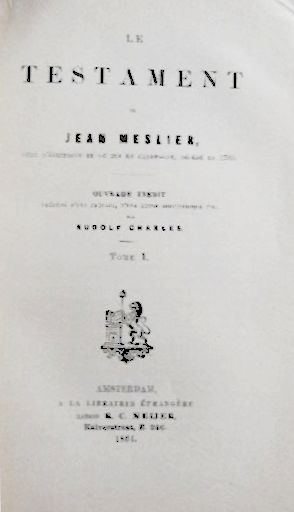 |
MISES, Ludwig von (1881-1973)
Geldwertstabilisierung und Konjunkturpolitik.
Jena, Verlag von Gustav Fischer 1928.
[IV],84p. Orig. printed orange wrappers, partly loosening. Small stamp (‘Deutsche Weltwirtschaftliche
Gesellschaft e. V.') below the imprint and at top of the upper wrapper, remainders of a label at foot of back. (#24235)
€ 350
First edition. ‘In the 1920s, von Mises fully developed his cycle theory, elaborating it in his
Geldwertstabilisierung und Konjunkturpolitik and applying it, in Die Ursachen der Wirtschaftskrise (1931),
to the great depression which began at this time and which he had anticipated. His theory aroused wide-spread interest on
the Continent and in England as an explanation of the unexpectedly severe depression. The policy conclusions he drew from
the theory were especially thought-provoking: strict laissez-faire and reduction of government expenditure; hard money and
abstention from any inflation; and freedom for market forces to complete their adjustments as quickly as possible, without
artificial propping up of wage rates, stimulation of consumption, or preservation of unsound investments and firms.'
*IESS XVI,p.380.
| 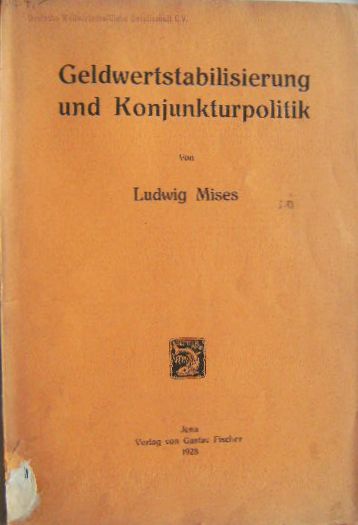 |
MISES, Ludwig von (1881-1973)
Die Gemeinwirtschaft. Untersuchungen über den Sozialismus.
Jena, Verlag von Gustav Fischer 1922.
VIII,503,[1]p. Orig. cloth-backed printed boards. First 3 leaves loosening bit still holding, else fine.
(#20534)
€ 850 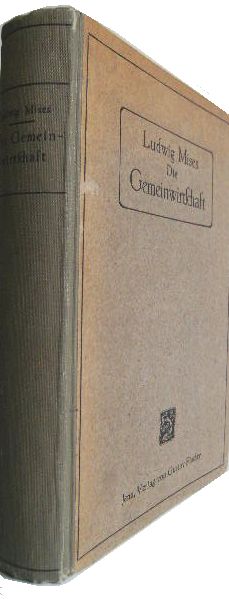 |
First edition. A refutation of the basic principles of socialist thinking, translated into English in 1936 as Socialism.
An economic and sociological analysis.
M.N. Rothbard wrote that it demonstrated ‘that a system of socialist planning cannot calculate economically, lacking
as it does a true price system based on private ownership of producer's goods. It follows that socialism cannot successfully
plan and operate a modern industrial economy. For two decades this issue was vigorously discussed, and most socialists
conceded that von Mises had pointed out a crucial problem which they had overlooked'.
*New Palgrave III,p.480. IESS XVI,p.380.
| 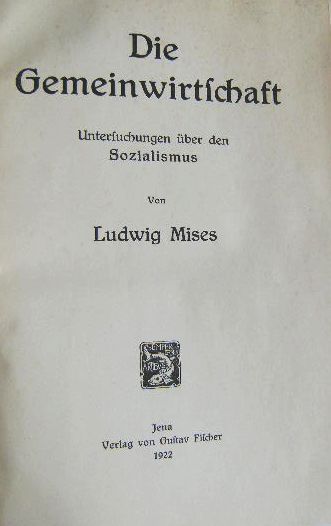 |
OORT, Jan Hendrik (1900-1992)
The stars of high velocity.
Groningen, Gebroeders Hoitsema 1926.
Folio. VIII,75p. Orig. printed wrappers, detached and with damaged back. With loosely inserted theses.
Small stamp and call number on title. (#38244)
€ 350
Original edition of the author's doctoral thesis. Oort was one of the greatest astronomers of the 20th century who
made significant contributions to the understanding of the Milky Way and who was a pioneer in the field of radio
astronomy. ‘Oort put astronomy in Leiden on the map and was one of the greatest scientists of the 20th century. Oort was
the Einstein of astronomy.' In his thesis he concluded that ‘there are two distinct classes of stars of probably different
origin'.
| 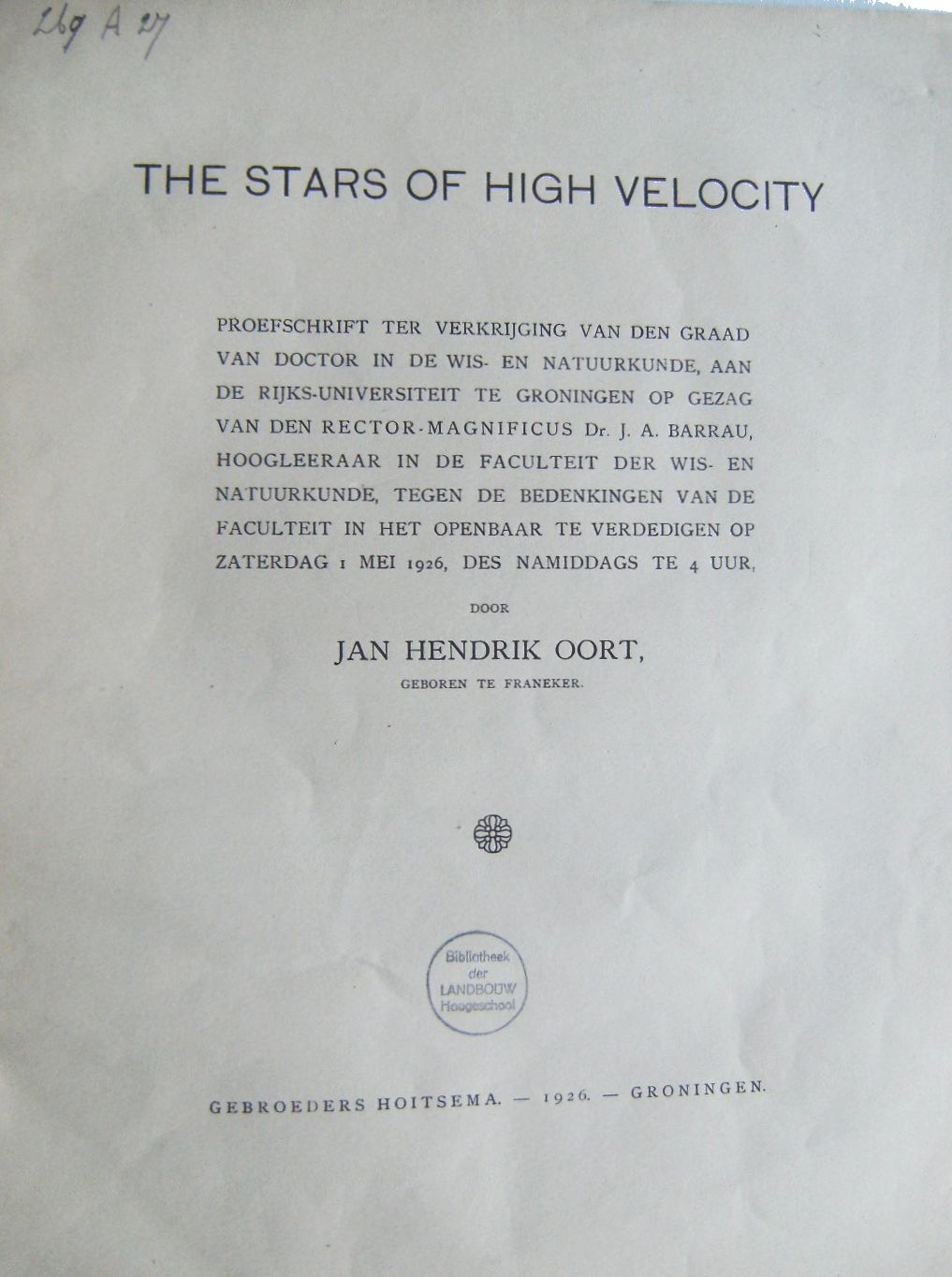 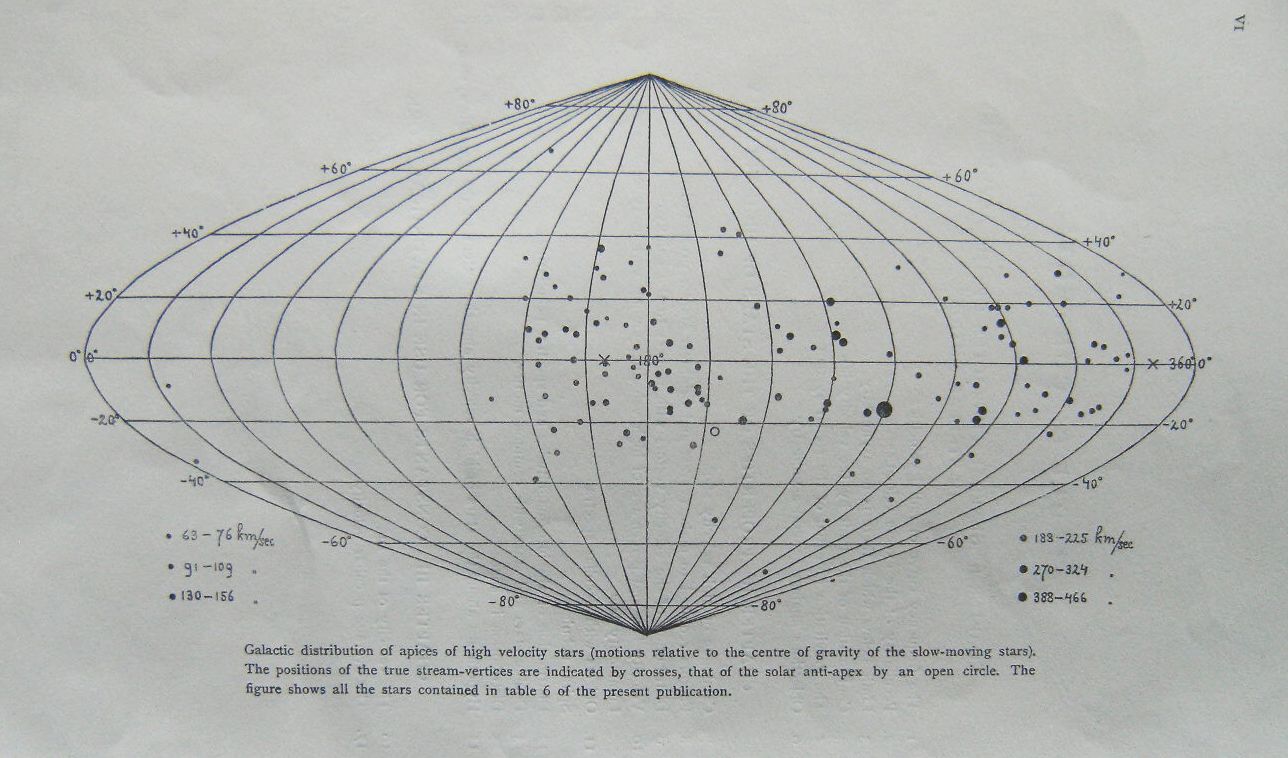 |
‘Undoubtedly the most eminent of the Venetian
economists of the 18th century‘ [ORTES, Giammaria
(1713-1790)]
Errori popolari intorno all' economia nazionale, considerati sulle presenti controversie fra i laici e i chierici, in
ordine al possedimento de' beni.
[Bologna, no printer] Con licenza de' superiori 1771.
4to. [II],VII,[1],118,[2 blank]p. Contemp. carta rustica, back covered with marbled paper. Small name
stamp (‘dott. Prof. Giovanni Miozzi') on first and last leaves, first leaves with some foxing spots. Fine copy with generous
margins. According to Kress, Italian printed in 200 copies only. (#31817)
€ 4500 |  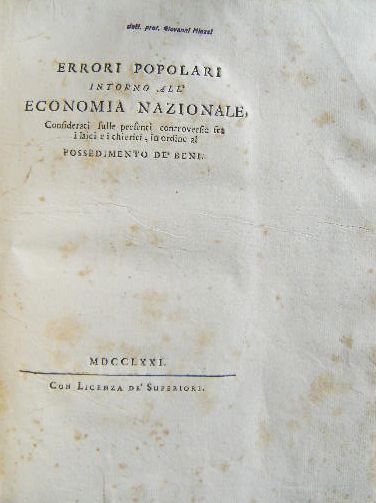 |
First edition, very rare. Ortes' first book, written ‘with the scope of upholding the existence of clerical property in
mortmain'. Ortes was a Venetian monk who left the cloister but remained in holy orders and was ever a streneous defender
of the clergy. ‘The Errori popolari itself is an attempt to treat certain economic questions by following the procedure
of a geometric treatise. He sets down certain axioms or what he believes are ‘general truths, derived from immutable and
necessary principles from which there is no deviation', and to these he opposes some of what he thinks are popular errors.
From these axioms he proceeds to particular cases which he investigates.'
‘Ortes is undoubtedly the most eminent of the Venetian economists of the last [18th] century; his genius, original and
sometimes paradoxical, is often opposed to the general tendency of the ideas of his time, and though his researches are
occasionally faulty in their method, he has left a deep impress on the history of economic theory. He regards economic laws
as immutable, like those of nature; he maintains this in opposition to the opinion usually accepted in his time, which
regarded economics only in relation to special interests. Perhaps it is this idea which leads him to distrust the action of the
state, considering it not adapted to promote the wealth of a country. While Ortes applied a mathematical method to
economics, his arguments are based throughout on abstract theory, disregarding the study both of facts and of history as not
appertaining to economic science. This detracts from the value of his labours. Still his works are of weight in the history of
economic theory.'
*Kress, Italian 403. Einaudi 4224. Mattioli 2638. Palgrave III,p.43. Theocharis p.40-43.
A classic of the Mathematical School of
economicsPANTALEONI, Maffeo (1857-1924)
Principii di economia pura.
Firenze [Florence], G.Barbèra 1889.
Small 8vo. 376p. Orig. blue cloth. Last leaf foxed. (Manuali Barbèra di scienze giuridiche, sociali
e politiche VIII) (#29858)
€ 750
First edition. Pantaleoni's most important book, a classic of the Mathematical School 'which contributed to the
introduction of marginalist ideas in Italian economic thought and which ... made a considerable impression outside Italy as
well'. 'Austrian or 'Austro-Walrasian' in fundamentals, enriched by Marshall's apparatus of foreign and domestic trade ... it
gave an important lead away from old and toward new things. In this consists its importance ... it is brilliantly written ... and
is still worth reading'. A second edition appeared in 1894 and an English translation in 1898.
*Einaudi 4280. New Palgrave III,p.794. Schumpeter p.857. Batson p.30.
| 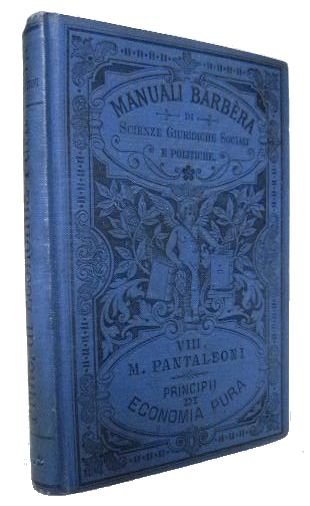 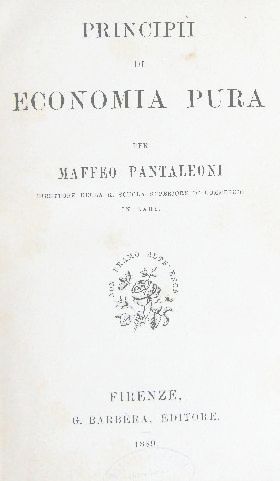 |
'A heroic attempt to reconcile God's omniscience and
omnipotence with free will‘POMPONAZZI, Pietro [Petrus Pomponatius]
(1462-1525)
Opera. De naturalium effectuum admirandorum causis, seu De incantationibus liber. Item De fato: libero
arbitrio: praedestinatione: providentia Dei, libri V. In quibus difficillima capita & quaestiones theologicae & philosophicae
ex sana orthodoxae fidei doctrina explicantur ...
Basiliae, ex officina Henricpetrina [Basel, Heinrich Petri] 1567.
Small 8vo. [LVI],[4 blank],1015,[1 printer's device]p. Seventeenth-century panelled and blind-tooled calf,
back richly gilt decorated, sides with gilt line borders, sprinkled edges, marbled paste-downs, a touch of wear to top of
back. A very fine copy. (#32846)
€ 6000
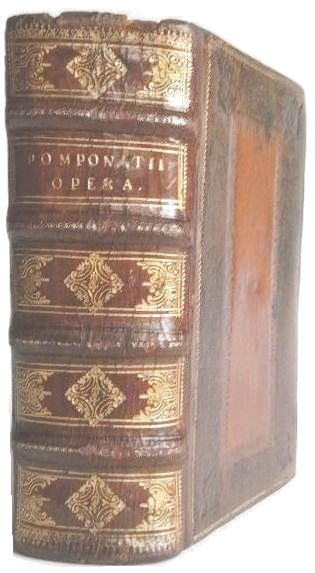 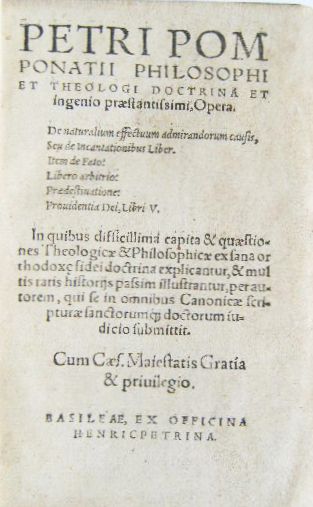 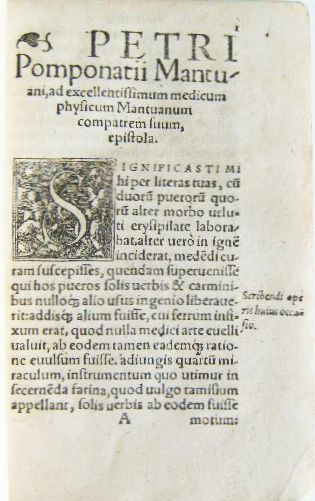 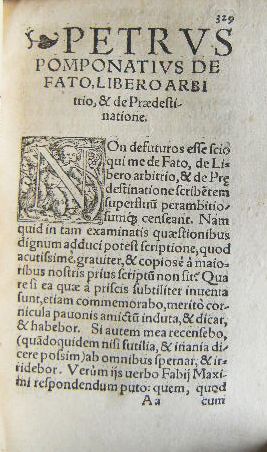
First edition of De fato, libero arbitrio, praedestinatione, providentia Dei occupying page
329-1015. This is preceded by Pomponazzi's De naturalium effectuum admirandorum causis, seu de Incantationibus,
usually known as De incantationibus, published previously in 1556.
In Of fate, free will, and predestination Pomponazzi ‘presents a double investigation of religious and
philosophical determinism, examining each of these traditions in relation to free will. It is a heroic attempt to reconcile
God's omniscience and omnipotence with free will'.
The publication of his heretical book on the immortality of the soul (De immortalitate animae, 1516) had
caused an outrage from prominent philosophers and theologians and was publicly burnt in Venice. Since then his later and
more important works were only available in manuscript and not printed until over 30 years after his death.
RIESSER, Gabriel (1806-1863)
Kritische Beleuchtung der in den Jahren 1831 und 1832 in Deutschland vorgekommenen ständischen
Verhandlungen über die Emancipation der Juden.
Altona, bei Johann Fiedrich Hammerich 1833.
[VIII],218p. Recently cloth-backed boards, orig. printed upper wrapper laid down. Some light soiling and
foxing. (#20254)
€ 900  |
First separate edition, previously published in the author's own journal Der Jude. In his Critical
examination of the ongoing negotiations in the years 1831 and 1832 in Germany on the emancipation of the Jews
Riesser focuses on the debate on the civil status of the Jews in four German states: Baden, Bavaria, Hanover and Kurhessen.
Riesser was a pioneer of Jewish emancipation in Germany. He studied law in Heidelberg, but was refused to practice
as a lawyer because of his religion. In reaction he published his famous pamphlet Ueber die Stellung der Bekenner des
Mosaischen Glaubens in Deutschland, which marked a turning point in the struggle for emancipation.
‘Riesser demanded emancipation for the Jews in the name of honor and justice. In his view the claim that the Jews
must convert in order to obtain full civil rights was evidence of contempt for religion. The Jews themselves must fight for
their own rights, and for that purpose they must organize themselves in special associations, since only by a common effort
and not as individuals do they have a chance of success' (Encyclopaedia Judaica).
| 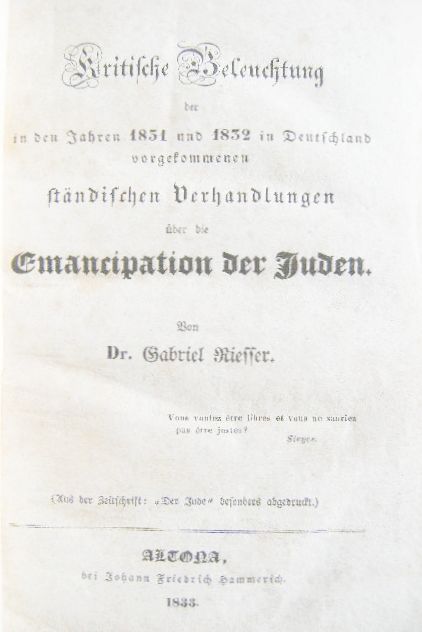 |
SALMASIUS, Claudius [Claude de Saumaise]
(1588-1653)
De usuris liber.
Lugd. Batavar. [Leyden], ex officina Elseviriorum [A.Elzevier] 1638.
Small 8vo. [LVI],686,[71]p. Contemp. overlapping vellum. Fine copy. (#17731)
€ 600 |  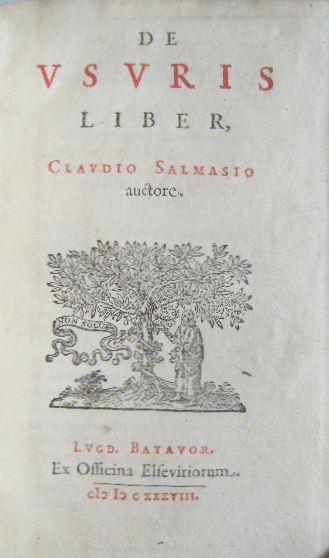 |
First edition. The present work is the first and most important of three works in which the author defends the taking of
a modest interest, against the official ban by the Church, as an indemnity to the person who lends it out. It was an important
step in the development of the modern doctrine of interest, and therewith in the development of capitalism.
Salmasius was born in France and in 1632 succeeded the famous Scaliger as professor at the University of Leyden,
and there became one of the best known adversaries of scholastic ideas. A supposed previous edition of 1630 is a fake.
*Kress 536. Einaudi 5085. Willems 471. Dekkers p.151,1. Schumpeter p.106.
SAMUELSON, Paul Anthony (1915-2009)
The collected scientific papers.
Cambridge and London, The M.I.T. Press [1966-86].
5 volumes. Orig. green (volumes 1-2 and 4), blue (volume 3) and red (volume 5) cloth, with dust jackets,
frayed at edges, not price-clipped. Bookplate to volume 4. (#21050)
€ 1250
First editions, first printings. These volumes contain all Samuelson's contributions to economics until 1985. Two
more volumes were published in 2011. Edited by Joseph E.Stiglitz (volumes 1 and 2), Robert C.Merton (volume 3), Hiroaki
Nagatani and Kate Crowley (volume 4) and Kate Crowley (volume 5). With the ‘detailed contents' to volume 4 loosely
inserted as issued.
Samuelson was the first American to win in 1970 the Nobel Prize in Economic. It was stated that he ‘has done more
than any other contemporary economist to raise the level of scientific analysis in economic theory'. ‘Samuelson considered
mathematics to be the "natural language" for economists and contributed significantly to the mathematical foundations of
economics with his book Foundations of Economic Analysis.'
| 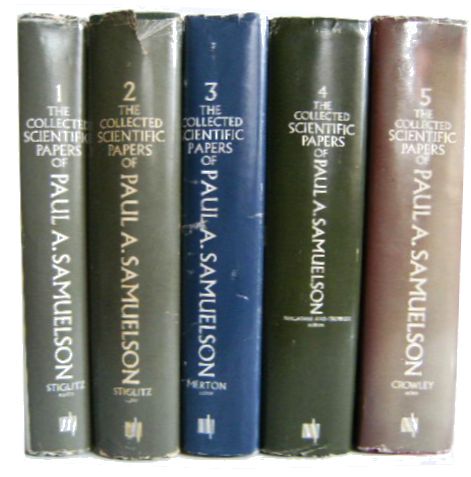 |
SCHMITT, Carl (1888-1985)
Der Wert des Staates und die Bedeutung des Einzelnen.
Tübingen, Verlag von J.C.B.Mohr (Paul Siebeck) 1914.
VI,[2],110,[2]p. Recently red cloth, newly sewn, back and front side gilt-lettered. (#11938)
€ 900 | 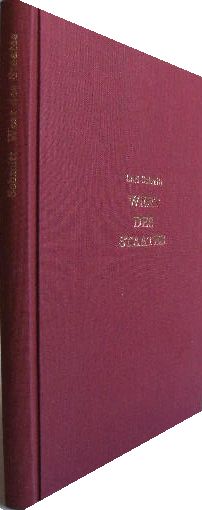 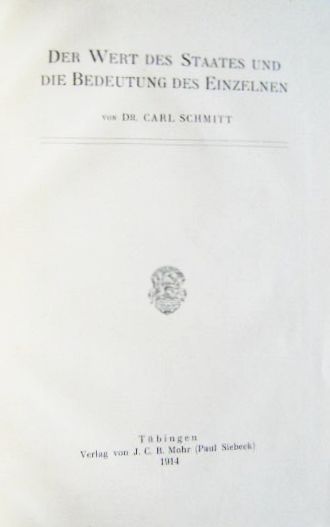 |
First edition. The Value of the state and the significance of the individual was one of Schmitt's earliest works,
with which he earned his habilitation from the University of Strasbourg. It followed his 1910 doctoral thesis Ueber
Schuld und Schuldarten. A second edition appeared 1917.
SCHWAB, Franz Xaver.
Handbuch der kaufmännischen Rechenkunst.
München, gedruckt mit Hübschmann'schen Schriften 1797-99
2 volumes in 1. [II],468, 162,[6],LXXXp. Contemp. half calf, marbled sides, yellow edges, gilt back, little
rubbed. Endpapers with ms. exercises. (#13464)
€ 750  |
First edition. A handbook of commercial arithmetic, divided into chapters on theoretical arithmetic, practical
arithmetic, fractures and their addition, subtraction, multiplication and division, special cases of calculating, interest, gold
and silver calculations, weights and measures, etc. The second volume is dedicated to bills of exchange and commodity
prices. It is interspersed with exercises, with solutions at the end of the volume.
We could not find any information about the author, other than that he was the author of another book with the title
Der Rechnungs-Gehülfe für Geschäfts-Leute jeder Art (1820).
*WorldCat locates several copies of a ‘much enlarged and improved edition', published in 1821, but only a single
copy of the second volume of the present edition. GVK adds only one location of this (UB Göttingen), and none of the
second edition.
| 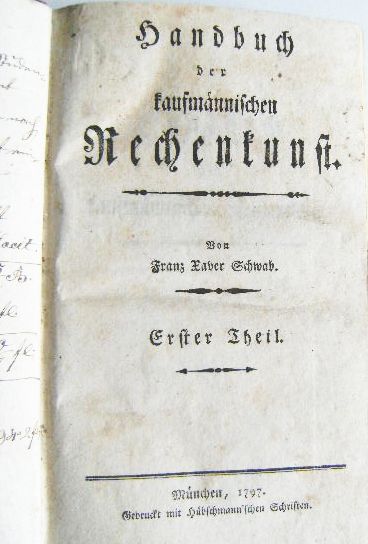 |
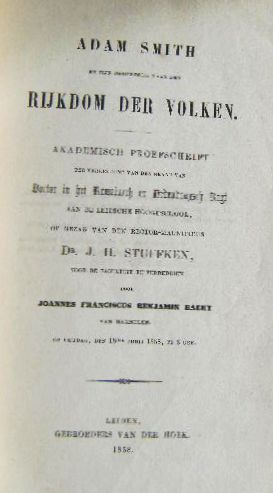 |
Smith, Adam. - BAERT, Joannes Franciscus Benjamin (1833-1909)
Adam Smith en zijn onderzoek naar den rijkdom der volken.
Leiden, Gebroeders Van der Hoek 1858.
[X],279p. Recent marbled wrappers. (#18032)
€ 125 |
First (only) edition, the author's doctoral dissertation for the University of Leiden. The first Dutch book dedicated to
Adam Smith. The author was a highly valued economist and statistician, of great importance for the proper functioning of
the Nederlandsche Bank in the second half of the nineteenth century.
TOCQUEVILLE, Alexis de (1805-1859)
L'Ancien régime et la Révolution.
Paris, Michel Lévy 1856.
XXI,[1 blank]456,[1 errata]p. Contemp. half morocco, marbled sides, endpapers and edges, gilt-lettered
back. Small stamp below the imprint. (#23308)
€ 750  |
First edition. Second great book of the author, almost as succesful as his earlier Democracy in America, a
thorough study of the causes of the French Revolution. It was conceived as the first volume of an unfinished greater work, a
second volume would treat the events of the Revolution itself and a third volume would deal with Napoleon.
Tocqueville did extensive research making use of numerous sources on the social, economic and political history of
France before the Revolution in order to understand why the Revolution took place in that country rather than anywhere else
in Europe. He concludes that the Revolution was not a rupture or a sudden surprise, but an acceleration of an evolution
already started under the Old Regime.
| 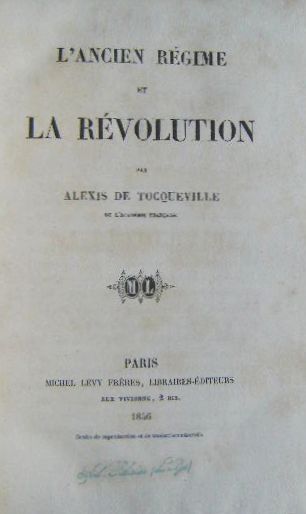 |
[WICQUEFORT, Abraham de (1606-182)]
Verhael in forme van journael, van de reys ende 't vertoeven van den seer doorluchtige ende machtige prins
Carel de II koning van Groot Britannien, &c. Welcke hy in Hollandt gedaen heeft, zedert den 25 Mey, tot den 2 Junij 1660.
[ Bound with:] Robertus KEUCHENIUS(1636-1673) Anglia
triumphans. Sive in inaugurationem serenissimi, potentissimi ac invictissimi principis, Caroli II ... poëmation
[ with half-title:] Engelsche triomph, ofte gedichten van verscheyde poëten, op de herstellinge van Carel de
II...
In ‘sGraven-Hage, by Adrian Vlack 1660.
2 volumes in 1. Folio (41 x 26 cm). [IV],4,132, 34,32p., several errors in pagination. With engraved
coat-of-arms of Charles II on both titles, 2 engraved headpieces, and 6 double-page engraved plates by David and Pierre
Philippe and Theodor Matham after J.Toorenvliet and A. van de Venne. Contemp. blind- and gilt tooled vellum, gilt edges,
some light soiling, corners slightly worn. Without the portrait. (#32147)
€ 1500
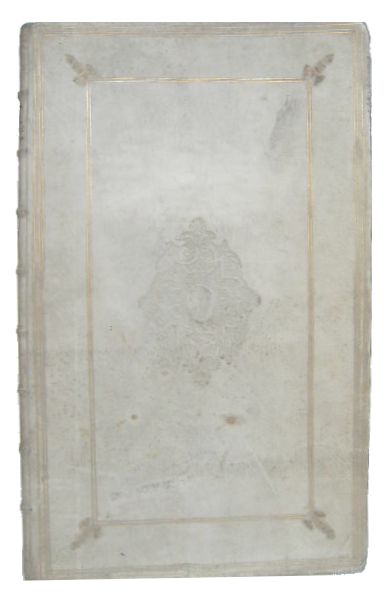 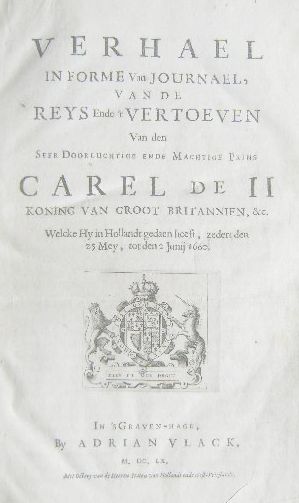 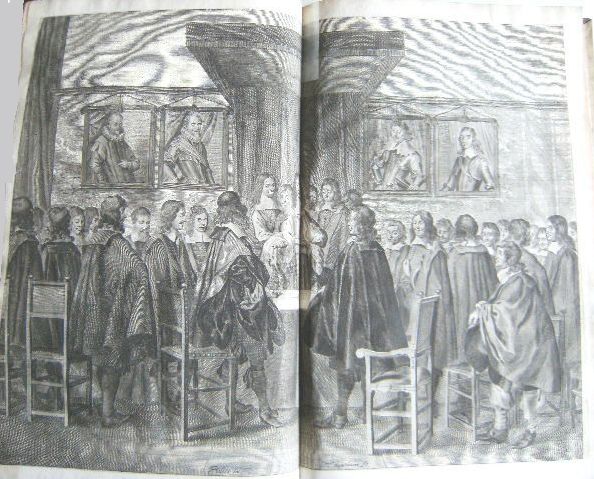 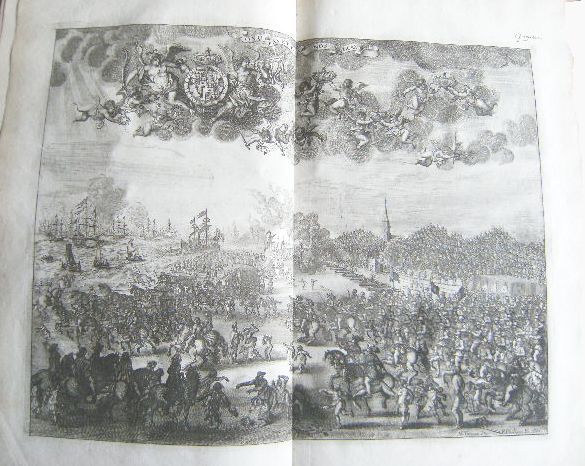 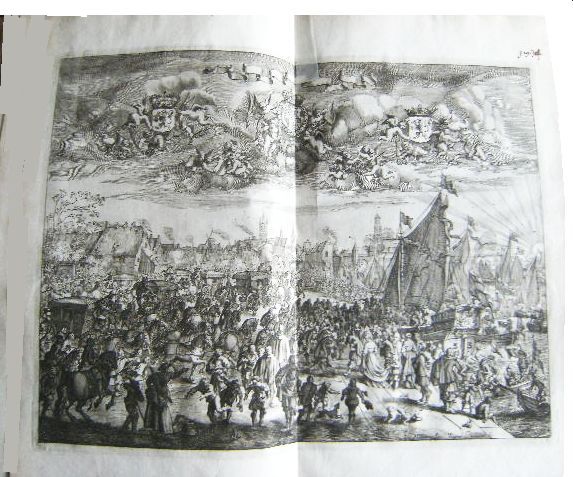
First edition. A splendidly illustrated acount of Charles II's travels through the Netherlands from Breda,
where he had lived during his exile, to the port of Scheveningen, to regain the Crown of England. Charles was
enthusiastically applauded and ‘the cities were too small to house all the people who desired to see the new king.'
The plates show Charles's arrival in Delft, his arrival in The Hague, a banquet at the Mauritshuis offered by the States
of Holland, Charles address to the States General, his address to the States of Holland (here in Muller's state b), and his
departure from Scheveningen.
This was also published in French and English (translated by Sir William Lower), by the same publisher and with the
same plates.
*Landwehr, Splendid ceremonies 126. Muller, Nederlandse historieplaten 2156.
WILLEM I, Prins van Oranje (1533-1584)
Aduijs ende raedt van mijn heere den Prince van Oraengien, op sekere articulen aen zyne Excellentie ghesonde
van weghen der ghedeputeerden van der Vnie, aengaende den vrede-handel, ende den middel om de Vyanden te wederstaen
en te verdryuen, en om dese Nederlanden ten besten dattet moghelic is te wederstelle in eene geduerighe ruste en voorspoet.
[At end: Aldus ghedaen inder stadt van Ghendt den xxviiisten dagh Septembris Anno M.D.Lxxix.]
[No place, no printer], Ghedruct int jaer ons heeren [1579].
4to. [16]p. Uncut and unopened, small blank corner of first leaf torn off. (#19770)
€ 900 | 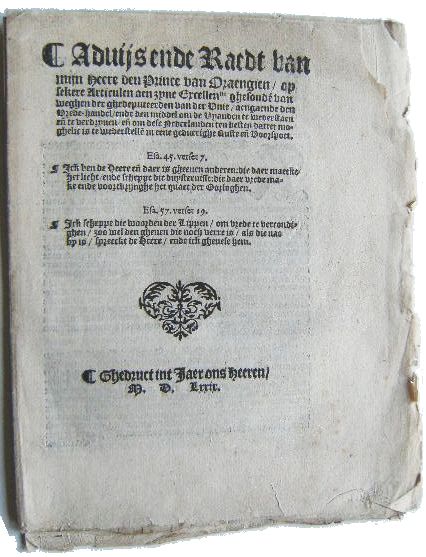 |
First (only) edition. Written on the occasion of the peace negotiations in Cologne in September 1779 between Spain
and the Dutch provinces, united earlier that year in the Union of Utrecht. The States General had asked the Prince for advice
on how to respond to the proposals made. The Prince justifies his own position after rumors had circulated that he would
oppose peace. The negotiations failed completely, for an important part because of the Spanish rejection of any form of
freedom of religion.
*Knuttel 503. Not in STCV or STCN. P.A.M.Geurts, De Nederlandse opstand in de pamfletten, p.90.
|
|
